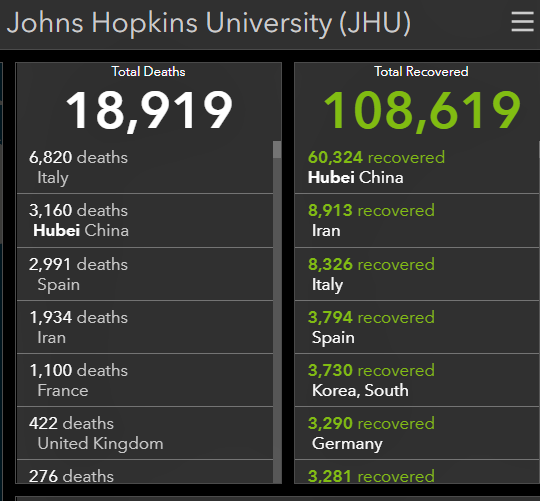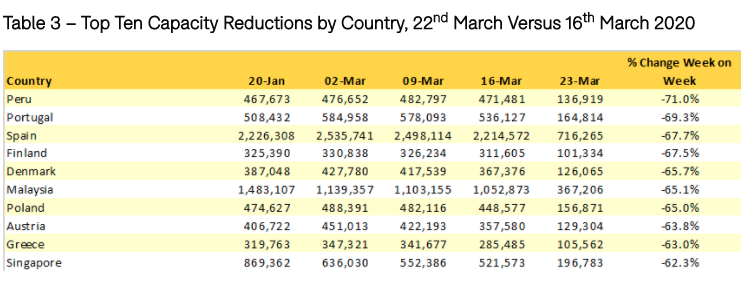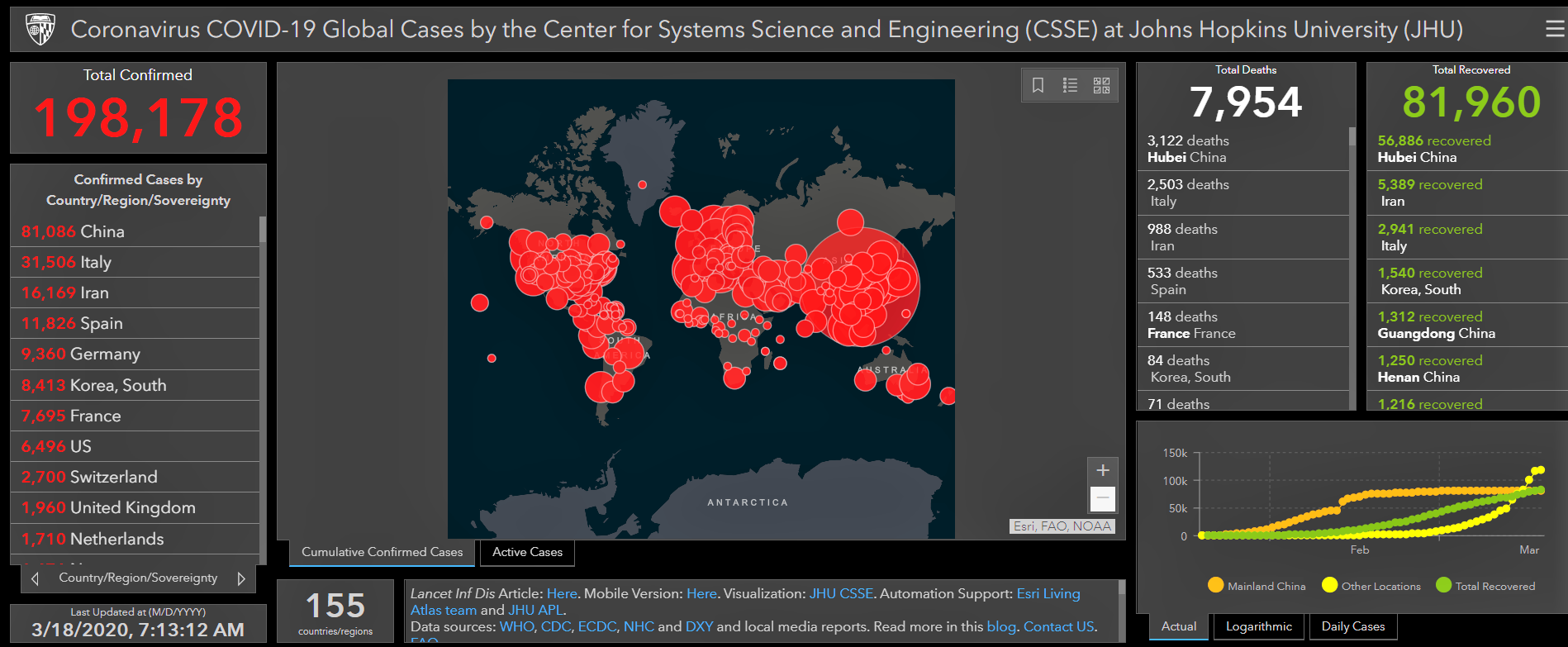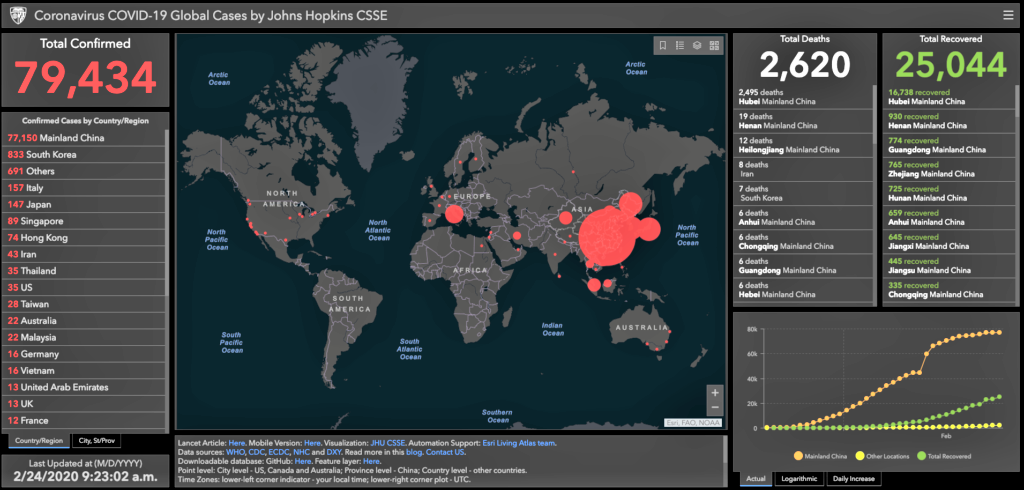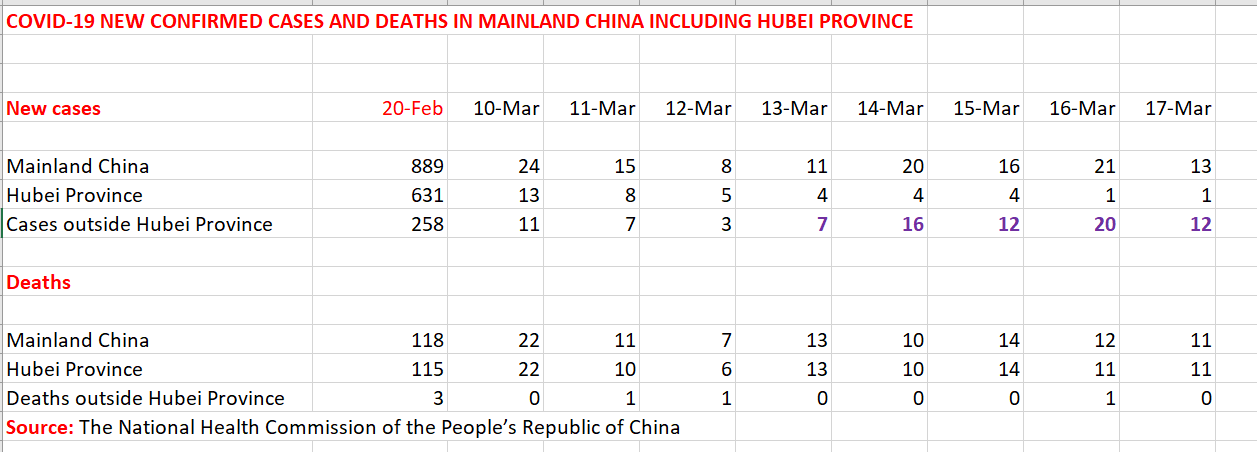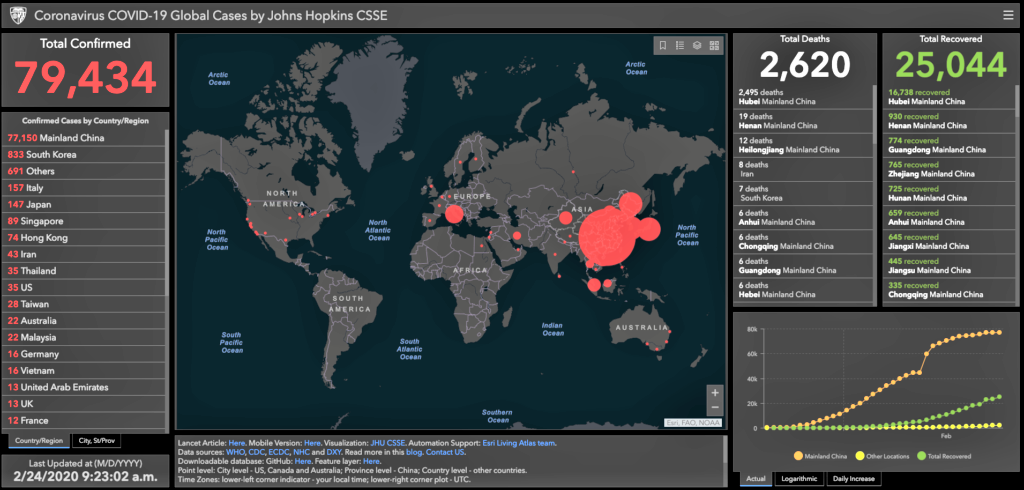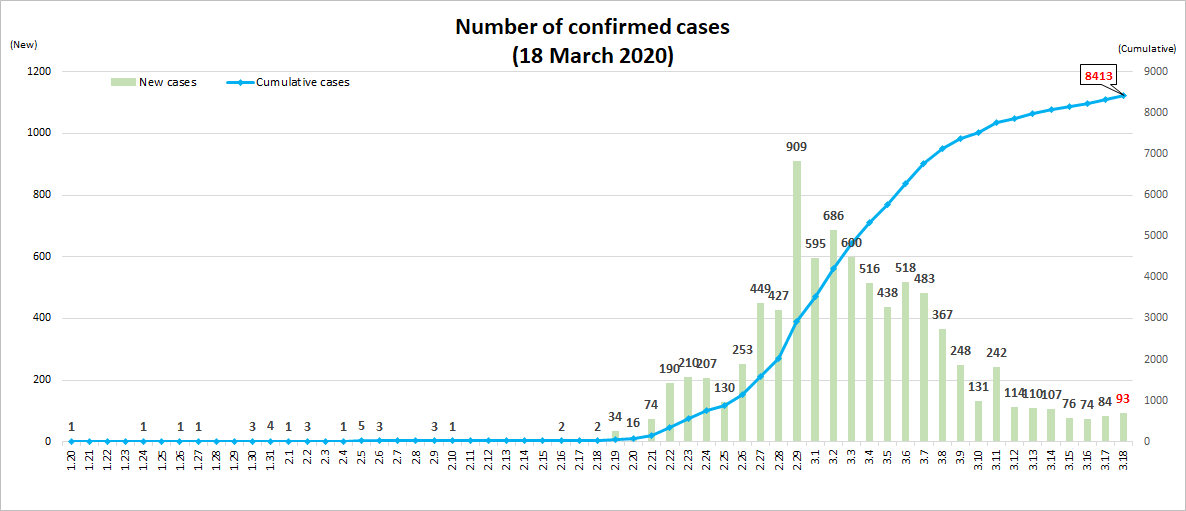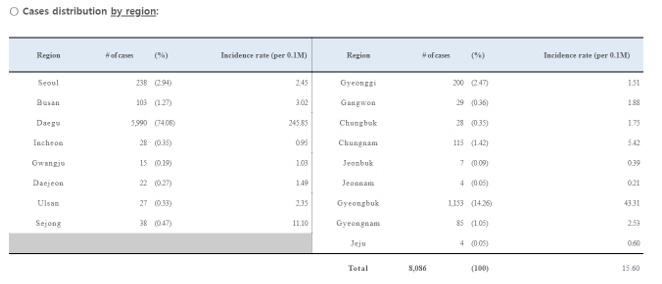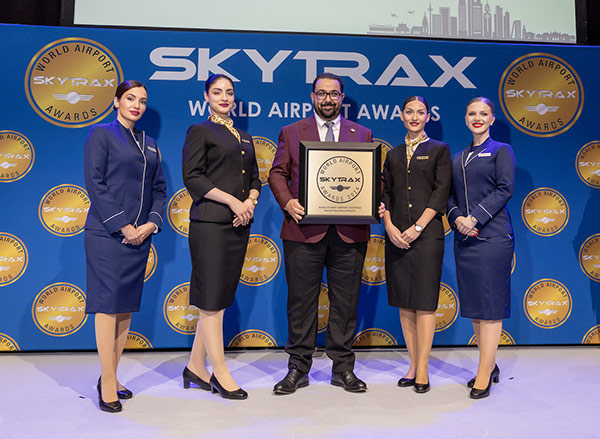For updates from 26 March on click here
25 March
France
Lagardère Group today suspended market guidance provided in late February about its 2020 performance, amid the deep impact of the COVID-19 crisis, notably on its travel retail arm. It said the full effects could not yet be assessed “precisely and reliably”.
Click here for the full story.
UK
London City Airport is suspending commercial and private flights from today (25 March). The shutdown is expected to last until the end of April, but will be kept under review.
In a statement, the airport added: “At this point in this fast-moving and unprecedented situation, we think this is the responsible thing to do for the safety and wellbeing of our staff, passengers and everyone associated with the airport.”
An important update from the airport at the heart of London.
We’re looking forward to welcoming you back soon. But for now, stay home and stay safe. https://t.co/WynJSJ3NaO pic.twitter.com/KEZLdHiZiv
— London City Airport (@LondonCityAir) March 25, 2020
International
Pernod Ricard has said it is anticipating a -80% decline in its travel retail business for the period from February to the end of June.
International
The global passenger traffic figures from Airports Council International (ACI) for January 2020 show the rapid impact the COVID-19 outbreak had on air travel.
Canada
The Canadian Airports Council (CAC) has reignited its calls for arrivals duty free in Canada as part of a number of measures designed to reinvigorate the country’s airports.
In a letter to Canadian Prime Minister Justin Trudeau, the trade body outlined how the government can help coronavirus-impacted airports by both providing short-term financial relief and introducing measures that will kick start an eventual relief.
Spain
Aena, the operator of Spain’s major public airports, will exempt commercial outlets in closed terminals from rent payments.
As reported yesterday (24 March), the Spanish Ministry of Transport, Mobility and Urban Agenda announced a series of terminal closures across the Aena network to consolidate operations. The number of scheduled commercial flights in Spain was down -82% year-on-year yesterday.
In its full announcement, the Ministry added: “The commercial activities of airports that cannot be operational as a result of these reorganisations will be exempt from the payment of the income that was applicable to them during the period of inactivity.”
International



South Korea
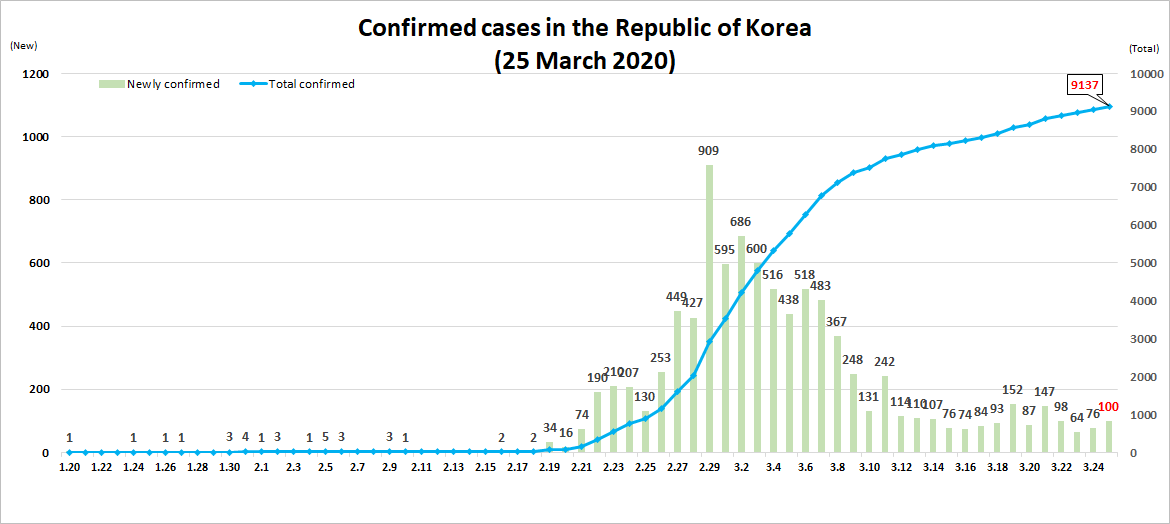
As a result in the recent rise of new imported cases, the government plans to apply stricter quarantine measures on US arrivals starting midnight Friday, the Korea Herald reported. The measures have so far only been applied to inbound travellers from Europe.
Of the 100 new cases yesterday, 51 were imported from overseas and 34 of them identified by airport quarantine screening, said the Korea Centers for Disease Control and Prevention. Foreign tourists and short-term visitors without symptoms will be tested and must await the results at designated facilities. If they test negative, they can enter the country but must report their health conditions on a daily basis to the authorities.
China
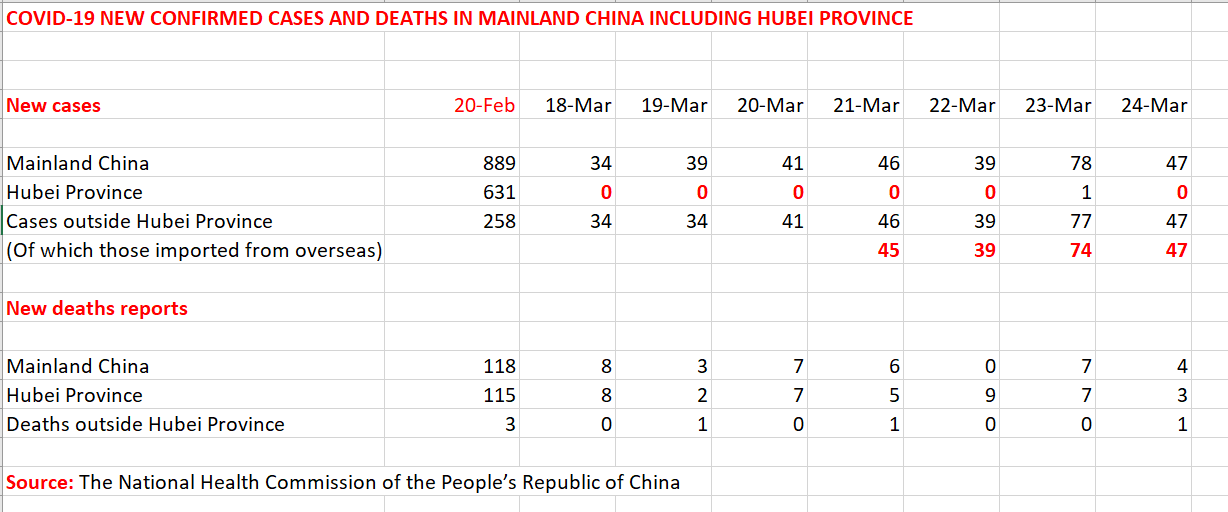
24 March
Japan
Japanese Prime Minister Shinzo Abe and International Olympic Committee (IOC) president Thomas Bach agreed today to postpone the Olympics until 2021.
International
The International Air Transport Association (IATA) has said that airline industry passenger revenues could fall by US$252 billion or -44% below the 2019 figure due to the impact of travel restrictions and the expected global recession brought on by the COVID-19 crisis.
The figures are based on a scenario in which severe travel restrictions last for up to three months, followed by a gradual economic recovery later this year.
IATA Director General and CEO Alexandre de Juniac said: “The airline industry faces its gravest crisis. Within a matter of a few weeks, our previous worst case scenario is looking better than our latest estimates. But without immediate government relief measures, there will not be an industry left standing.”
Passenger traffic has fallen dramatically worldwide, though IATA notes that a partial recovery is underway in China domestic.
Qatar
Qatar Airways announced that it will continue to operate in over 70 cities worldwide with more than 150 flights day. The airline sent a message of reassurance to partners and passengers that it will get ‘as many people as possible home safely to their loved ones.’
In a statement, the airline said: “We are constantly reviewing our operations to see where there is more demand and requests, and wherever possible we will add more flights or bigger aircrafts.”
“This is a challenging time for the aviation industry, and we are thankful to airports and authorities and their staff around the world for their incredible efforts to help us get passengers home.”
China
In what is shaping as a landmark moment for the battle against COVID-19 in China, the lockdown of Wuhan, Hubei Province, where the first confirmed coronavirus case was reported, will be lifted on 8 April, reports Global Times. This will allow people to travel outside the province for the first time in around two months. In other cities, outbound traffic control measures will be lifted as soon as tomorrow.
Global Times noted: “Lifting the lockdown is seen as a major sign that the country has scored a victory in this battle. It has been over two months since Wuhan, a city with about 11 million population which was hit the hardest by the COVID-19 pandemic, was completely locked down.
“The National Health Commission said no new confirmed cases have been reported in Hubei from Wednesday to Sunday, and the World Health Organization said Wuhan’s recovery from the COVID-19 pandemic gives the rest of the world hope as the highly contagious disease has spread to 168 countries and regions as of Tuesday.”
UK
London Heathrow Airport has called on more airlines and freight companies to maximise the use of the hub’s quieter schedule so that the aviation industry can play its part in the economic and social fight against COVID-19.
It noted that air freight can keep vital supply lines open and help to get time-critical and temperature-sensitive goods, such as medical supplies and food, across the UK.
Next week, Heathrow’s cargo movements are forecast to increase by +53%, as more airlines and freighters use the available capacity to transport goods which will assist in the fight against coronavirus. This figure is set to increase further as the airport scales up its cargo operation. It noted that pharmaceutical products are one of Heathrow’s top imports, with the airport handling 41% of the UK’s pharmaceutical imports (by value). In 2019, over 12,000 tonnes of medical supplies such as medicines, vaccines, sanitisers, syringes and respirators travelled through Heathrow.
Heathrow CEO John Holland-Kaye, said: “This is an unprecedented time for the international community, with COVID-19 requiring us all to work together, adapt and adopt extraordinary measures to quell the spread of this virus. For the first time in a decade, our airport has additional capacity in its schedule, capacity which we’ve begun to see used to help push vital supplies across the globe to help support frontline teams in the battle against this pandemic.
“We stand ready to support the country through this crisis. Our intention is to remain open at all times to serve those passenger flights that will continue to operate. And as the UK’s biggest port, we will temporarily increase the number of dedicated cargo flights. These will bring in vital supplies of food and medical equipment to help Britain weather this storm.”
Australia/New Zealand
Lagardère Travel Retail has begun closing stores across its Australia and New Zealand network, in line with government moves to slow the outbreak of COVID-19 in these countries. The closures, which are effective from 23 or 24 March depending on the location, run for an initial four weeks.
In New Zealand they include stores at Auckland, Christchurch, Dunedin, Nelson, Palmerston, Queenstown, Rotorua and Wellington. In Australia they include Adelaide, Cairns, Melbourne, Perth and Sydney.
Lagardère Travel Retail CEO Pacific Przemek Lesniak said in a note to partners: “Unfortunately, we have had to start implementing some unprecedented measures in order to keep our team safe and our business strong for the future.
“This week we began the process of temporarily closing some of our retail locations. These are predominantly in terminals that are exposed to international traffic. In addition to our planned temporary store closures, we have now been faced with the change in the Alert Status in New Zealand which has forced us to close all our stores and warehouses there as they are deemed non-essential. These measures are in place for four weeks but will be continually reviewed by the government.”
Spain
Spanish airports group Aena has announced a series of terminal closures across its airport network in the face of the COVID-19 outbreak. These will take effect in coming days.
At Adolfo Suárez Madrid-Barajas Airport, operations at terminals 1, 2 and 3 and T4S will be suspended, with all flights moving to T4.
At Josep Tarradellas Barcelona-El Prat Airport, all flights will be concentrated in Terminal 1 areas A and D, with T2 closing.
At Malaga Airport, all flights will operate from T2 from 24 March.
Airports in the Balearic and Canary Islands have already cut back operations. Further to this, there will be partial closures of the terminals at these airports to match the limited numbers of flights.
Aena said that only those outlets that meet the essential needs of workers and travellers will remain open at the airports, mainly F&B, press and convenience. Lounges are closed and Meet & Assist services are suspended.
Germany
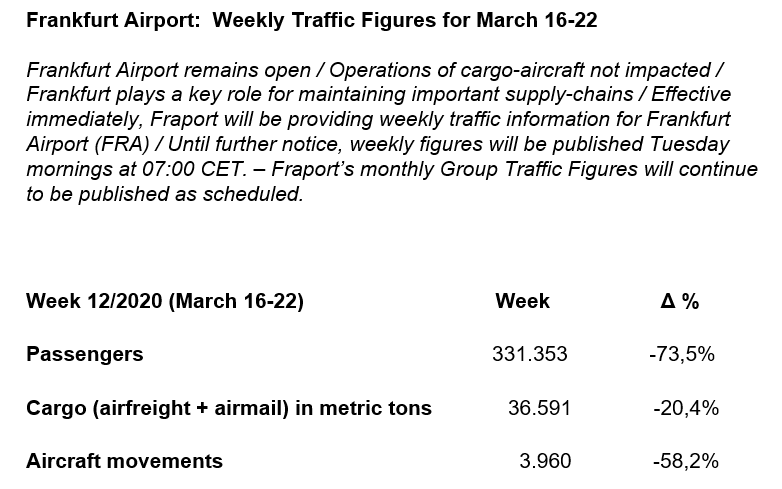

China
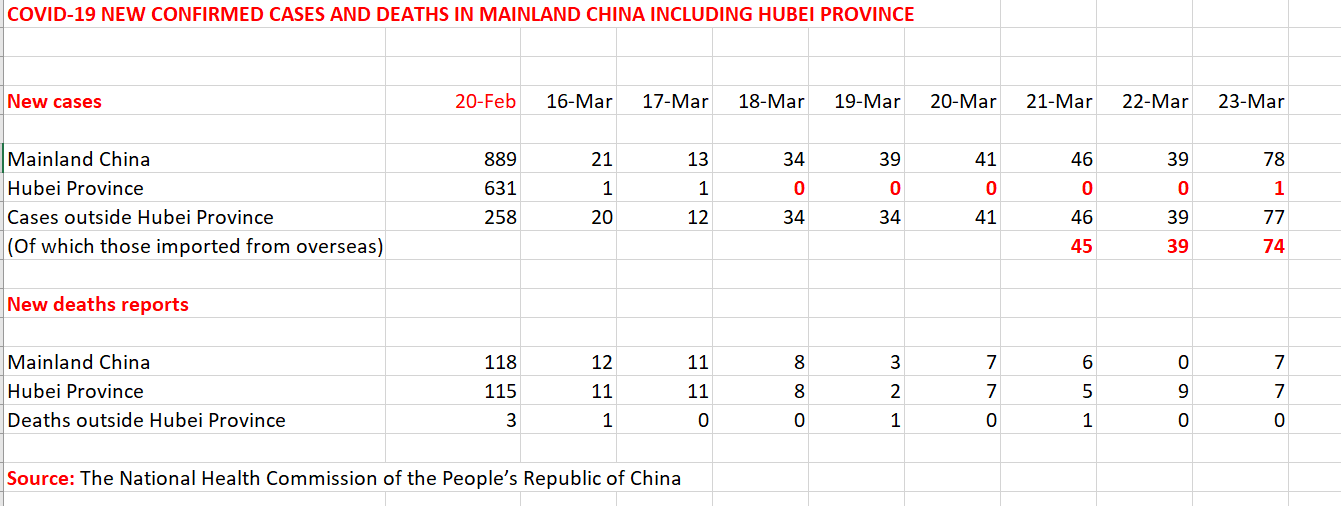
23 March
International
Flight schedules analyst OAG has outlined the scale of the COVID-19 crisis for the aviation market in its latest update, with airlines cutting 21 million seats from global capacity in the last week alone. However, China is adding capacity to its domestic market as far fewer cases are reported and confidence begins to return (see below).
The global picture shows a -23% capacity reduction in one week, and the market down by 37 million seats compared to ten weeks ago. In that period aviation has seen 35% of capacity wiped out.

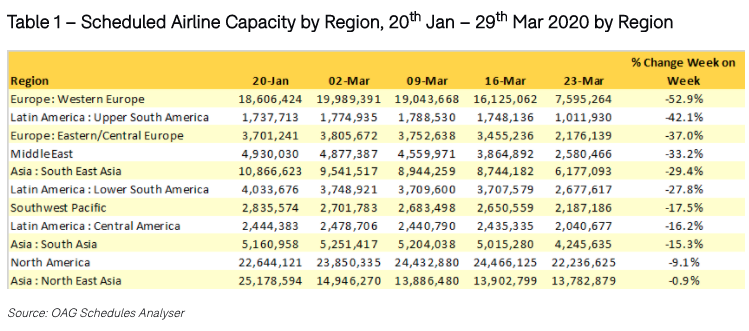 By major market, capacity in Western Europe has fallen by -53% in seven days, Latin America is down by -42% and the Middle East -33% (even before Emirates suspends services on Wednesday).
By major market, capacity in Western Europe has fallen by -53% in seven days, Latin America is down by -42% and the Middle East -33% (even before Emirates suspends services on Wednesday).

OAG noted: “Those looking for the shoots of recovery will immediately focus on China where a further 217,000 domestic seats could be seen as positive against what is a dramatic situation.”
Capacity in the US and other large markets such as India, Indonesia and Brazil are also seeing sharp cuts to schedules in the past week.
Of those markets with more than 100,000 seats a week, Peru has seen a fall of -71% in capacity. In Spain there are 1.5 million seats fewer and in Malaysia the figure is over 600,000.
Hong Kong
Airport Authority Hong Kong today announced a HK$1 billion package of relief measures for partners to alleviate the impact of the COVID-19 outbreak.
It includes rent relief totalling HK$320 million (US$41 million) for airport shops and restaurants paying a fixed rent. The rental concession will be 70% for three months from March to May, and 50% in June, as stepped-up support from the 20% fixed rental discount starting last October.
International
French conglomerate Vinci, whose airports division spans operations in France, UK, US, Japan, Cambodia, Portugal, Sweden, Dominican Republic, Costa Rica, Serbia, Brazil and Chile, has said that the COVID-19 pandemic has had “a significant impact” on its activities.
In a market update, Vinci said: “Until 20 February 2020, passenger numbers at airports managed by Vinci Airports were stable relative to 2019, despite the sharp fall in air traffic in Asia. By the end of February, the decline remained limited (-1.4%), but passenger numbers have fallen sharply in March, with an estimated -40% decline in the first three weeks of the month.
“That decline has worsened in the last few days following containment measures and decisions taken by some countries to close their borders. A plan to reduce operating expenses and defer investments is currently being implemented across all airports in compliance with contractual and aeronautical obligations and government decisions.”
The group said it has strong liquidity, with available net cash of €6.5 billion at end of February plus a line of credit currently unused. It confirmed that it did not expect to hit its financial targets for FY2020.
UAE
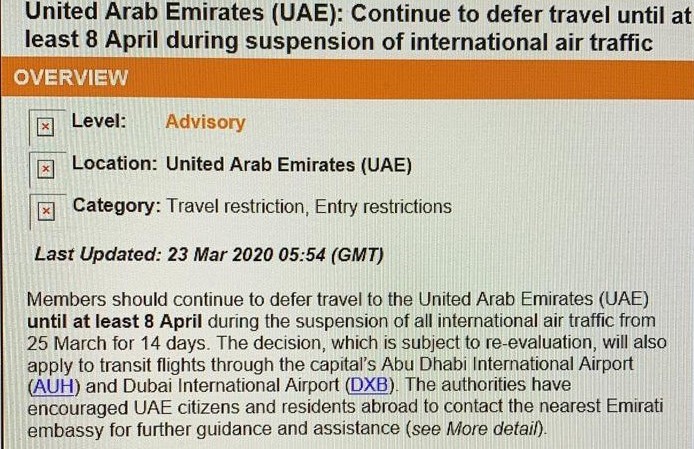
USA
Denver International Airport has offered much-needed rent relief to business tenants and airline partners from April through to June, local Denver media Westword reports.
CEO Kim Day said the airport had “proactively implemented policies to give relief” to key tenants and airlines.
For the next three months concessionaires will move minimum annual guarantee (MAG) payments to “a percentage rent as outlined in their leases,” said Day. “We are similarly changing our rental car companies from a MAG to a percentage rent for this same period and have allowed them, too, to defer three months of rent until later this year. These measures will help all of them, and for some this may make the difference as to whether they can continue to operate.”
UK
Important, welcome and laudable news from rail operator Network Rail, which on Friday announced support measures aimed at supporting retailers in Britain’s busiest and biggest stations, and small business tenants across their commercial estate, as the COVID-19 pandemic begins to severely impact trading.
Retailers in stations typically pay a minimum guarantee (base rent), and a turnover rent based on sales. However, with immediate effect, Network Rail has cancelled all first quarter (25 March – 23 June 2020) rent payments due from tenants in their commercial estate portfolio.
Further, the operator is cancelling all base rent payments for retailers in its managed stations for the first quarter of the new financial year (April-June 2020).
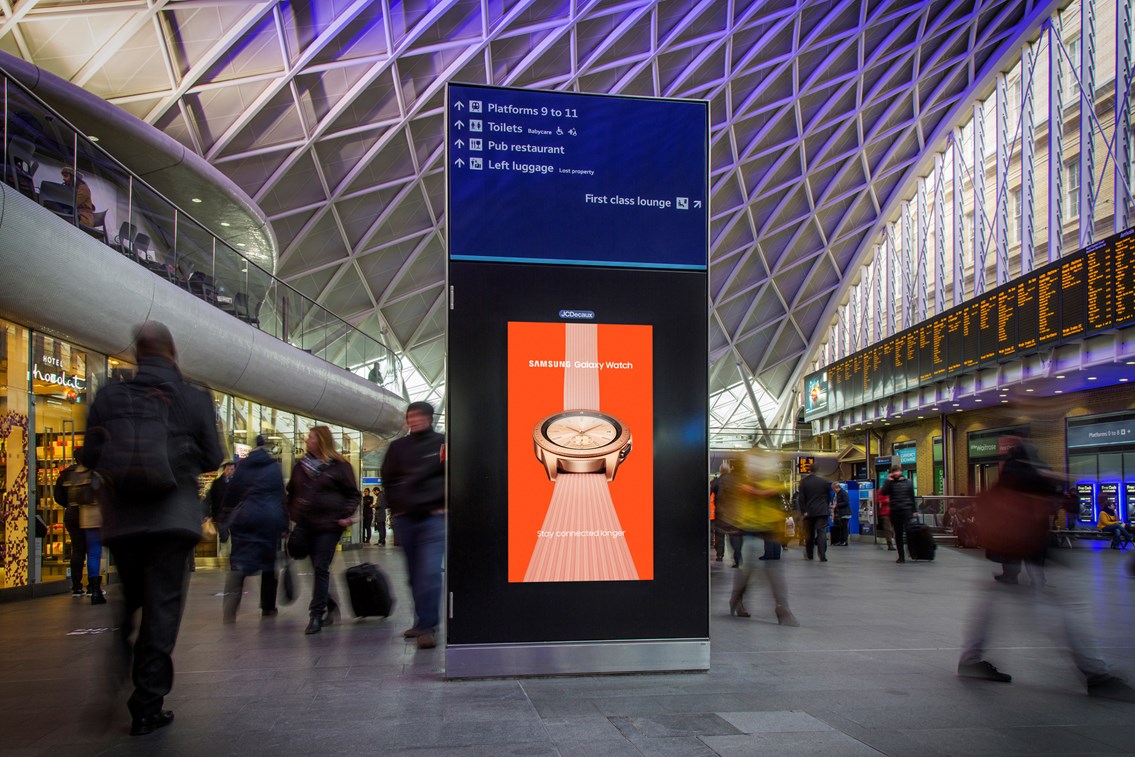
Network Rail Property Managing Director David Biggs said: “We work in partnership with retailers and tenants to provide positive experiences for passengers and communities. In challenging times, it is important we step up to the plate and show our partners they are valued, and we are ready and willing to help. That is why we have taken this decisive action today.
“We also understand more support may be required as this situation develops. We will continue to liaise with central Government and will keep speaking with our retailers and tenants about how we can assist further.”
UAE
Etihad Airways has further cut services across its network from 22 March, with suspensions to and from key destinations.
The airline has suspended flights to the vital Indian market for the coming week initially. That includes Delhi and Mumbai (22-29 March) and Ahmedabad, Bangalore, Chennai, Cochin, Hyderabad, Kolkata, Kozhikide and Trivandrum (22-28 March).
Other suspensions (most of which run to 30 April) include Baku, Minsk, Brussels, Chengdu, Shanghai, Cairo, Hong Kong (to 30 June), Rome, Milan, Nagoya (to 30 June), Nairobi, Amman, Beirut, Kuwait, Casablanca, Lagos (to 23 April), Karachi, Lahore, Islamabad (to 4 April), Moscow, Riyadh, Jeddah, Amman, Medina, Belgrade, Madrid, Barcelona, Khartoum, Geneva, Zürich and Istanbul.
From 22 March, all Etihad Airways flights to Beijing stop in Xi’an, where passengers are required to disembark for health screening, customs clearance and to claim their baggage.
Thailand
Airports of Thailand Public Company (AoT) today outlined the drastic impact of the COVID-19 outbreak on passenger traffic in recent weeks across its six airports: Suvarnabhumi and Don Mueang International in Bangkok, Chiang Mai International, Hat Yai International, Phuket International, and Mae Fah Luang-Chiang Rai International.
AoT told the Stock Exchange of Thailand that based on data collected on 3 March, a total of 32,991 early flight cancellations and suspensions had been recorded for the period 24 January to 28 March 2020, consisting of 26,648 international flights and 6,343 domestic flights.
AoT said that it expects aeronautical revenues in terms of landing charges and passenger service charges will drop by -20.69% and -32.94% year-on-year, respectively, for that period, a total of some -30%. However, this figure excludes the impact of a decrease in non-aeronautical revenues (principally duty free shopping -Ed) and assistance measures for airlines and other operators.
South Korea

China
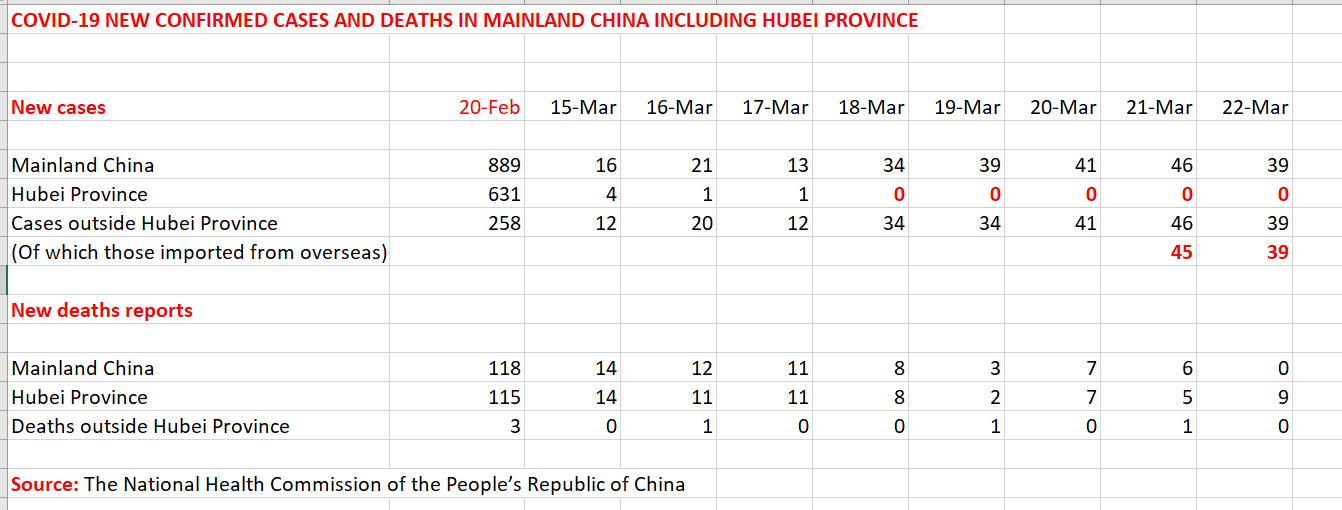
International
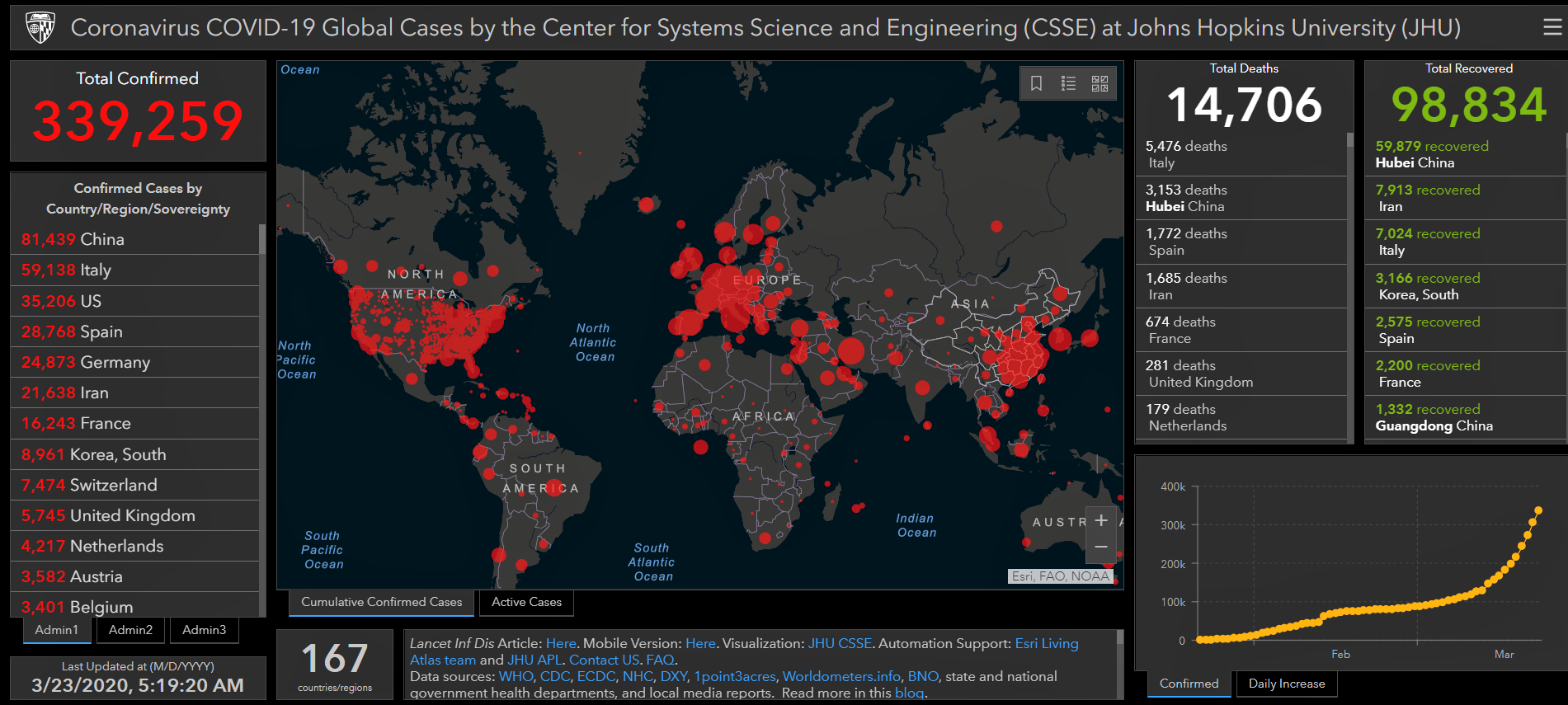

22 March
UAE
Emirates Airline is to suspend most of its passenger flights from 25 March in response to the COVID-19 outbreak. To support the repatriation of travellers, services to the following countries and territories will continue as long as borders remain open, and there is demand: the UK, Switzerland, Hong Kong, Thailand, Malaysia, Philippines, Japan, Singapore, South Korea, Australia, South Africa, USA and Canada.
Emirates Group Chairman and Chief Executive HH Sheikh Ahmed bin Saeed Al Maktoum said: “The world has literally gone into quarantine due to the COVID-19 outbreak. This is an unprecedented crisis situation in terms of breadth and scale: geographically, as well as from a health, social, and economic standpoint. Until January 2020, the Emirates Group was doing well against our current financial year targets. But COVID-19 has brought all that to a sudden and painful halt over the past six weeks.

“As a global network airline, we find ourselves in a situation where we cannot viably operate passenger services until countries re-open their borders, and travel confidence returns. By Wednesday 25 March, although we will still operate cargo flights which remain busy, Emirates will have temporarily suspended most of its passenger operations. We continue to watch the situation closely, and as soon as things allow, we will reinstate our services.”
With many of its airline customers dramatically reducing flights or ceasing services altogether, services division dnata has also significantly reduced its operations, including temporarily shutting some offices across its international network.
The Emirates Group has also undertaken measures to contain costs, “as the outlook for travel demand remains weak across markets in the short to medium term”. This includes:
- Postponing or cancelling discretionary expenditure.
- A freeze on all non-essential recruitment and consultancy work.
- Working with suppliers to find cost savings and efficiency.
- Encouraging employees to take paid or unpaid leave in light of reduced flying capacity.
- A temporary reduction of basic salary for the majority of Emirates Group employees for three months, ranging from -25% to -50%. Employees will continue to be paid their other allowances during this time. Junior level employees will be exempt from basic salary reduction.
- Presidents of Emirates and dnata – Sir Tim Clark and Gary Chapman – will take a 100% basic salary cut for three months.
Sheikh Ahmed said: “Rather than ask employees to leave the business, we chose to implement a temporary basic salary cut as we want to protect our workforce and keep our talented and skilled people, as much as possible. We want to avoid cutting jobs. When demand picks up again, we also want to be able to quickly ramp up and resume services for our customers.”
The company said it has strongly discouraged its employees from non-essential travel, implemented work from home policies for employees where operationally feasible, enhanced cleaning and disinfection protocols at its facilities, introduced temperature screening at offices and launched internal educational campaigns on hand hygiene and health practices to reduce risk of COVID-19.
Sheikh Ahmed said: “These are unprecedented times for the airline and travel industry, but we will get through it. Our business is taking a hit, but what matters in the long run is that we do the right thing for our customers, our employees and the communities we serve. With the support and unity that we have seen from our employees, partners, customers, and other stakeholders, I’m confident that Emirates can tackle this challenge and come out stronger.”
Thailand
 King Power Rangnam, the Thai travel retailer’s flagship location and one of Asia’s and the world’s most important duty free doors, has closed today in line with a new government edict that orders the temporary closure of all shopping centres, entertainment venues and markets. As reported, the travel retailer’s other Bangkok store, King Power Srivaree, was already shut temporarily.
King Power Rangnam, the Thai travel retailer’s flagship location and one of Asia’s and the world’s most important duty free doors, has closed today in line with a new government edict that orders the temporary closure of all shopping centres, entertainment venues and markets. As reported, the travel retailer’s other Bangkok store, King Power Srivaree, was already shut temporarily.
King Power Rangnam will remain closed from today until 12 April, the retailer confirmed. Simultaneously, the airport drop-off service in Bangkok will be suspended. The Pattaya and Phuket downtown stores remain open as does online duty free.
The Thai judiciary announced today that in view of the latest developments on the COVID-19 outbreak, the General Adjourned Period, which has been in effect since 29 January will be extended for two weeks from 23 March until 5 April and be subject to further review. Thailand has reported 411 confirmed cases as of late afternoon today.
King Power said it will actively cooperate with the government’s decision to jointly fight the epidemic.
International
At a time of immense uncertainty in our lives, it is worth looking at this set of figures from WorldMeters.info which show us that a very large majority of infected patients recover. The death toll is indeed heavy, and in some cases such as Italy, devastatingly so, but the heavy weighting of survivors vs those lost must be continually restated.

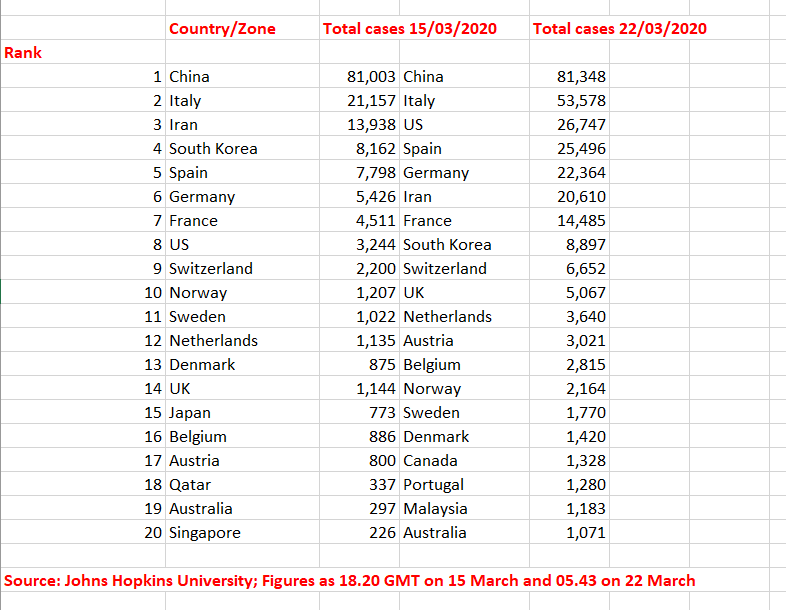
China
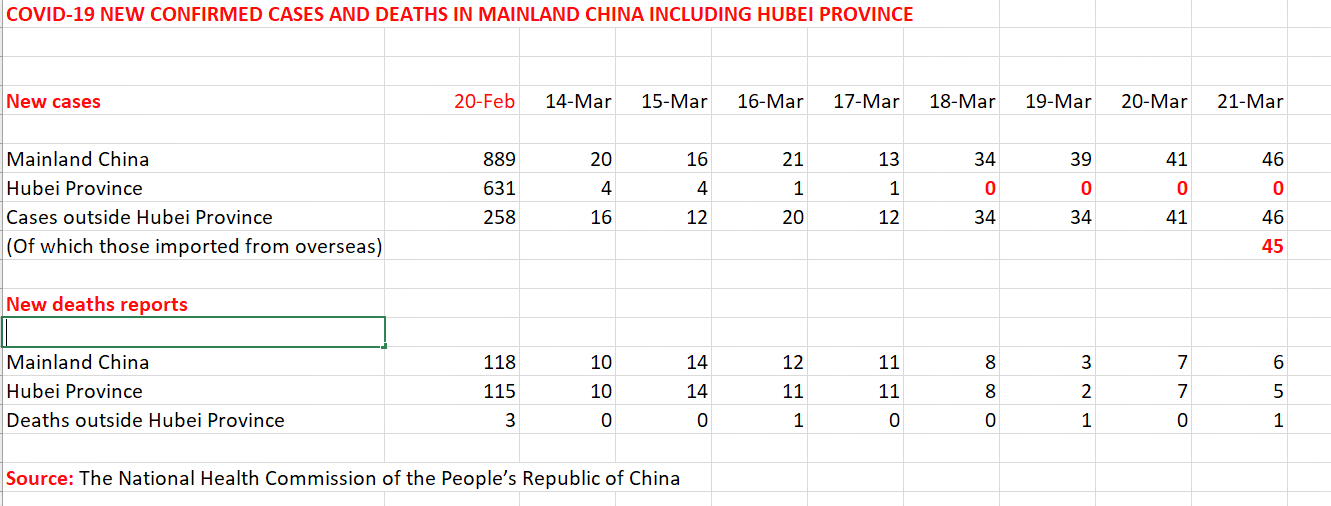
South Korea
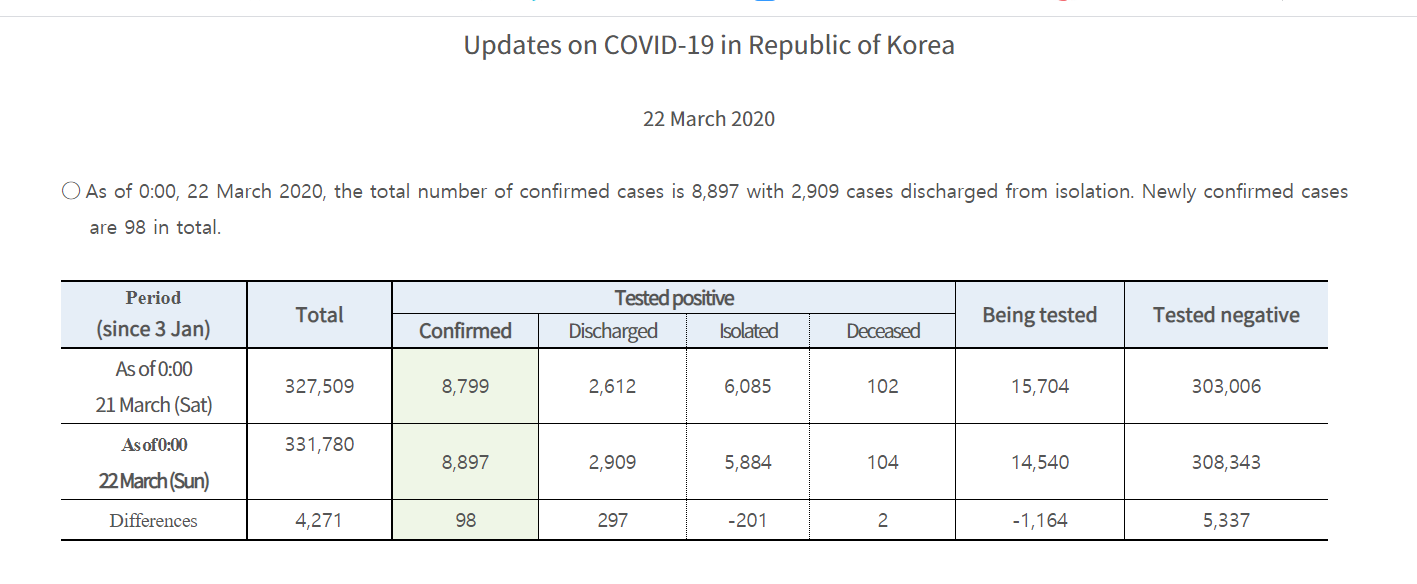
21 March
China
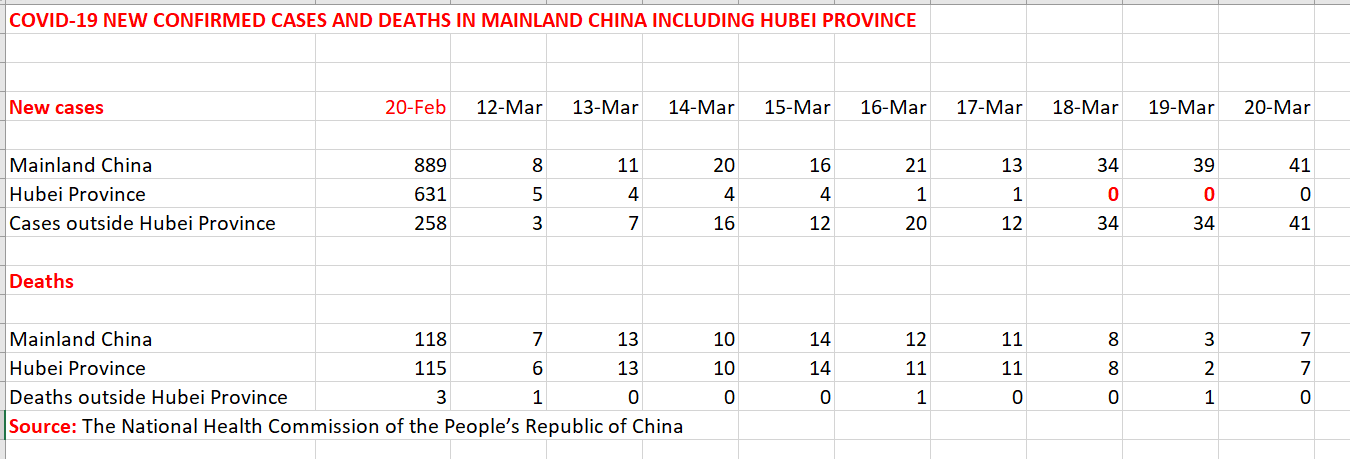
South Korea
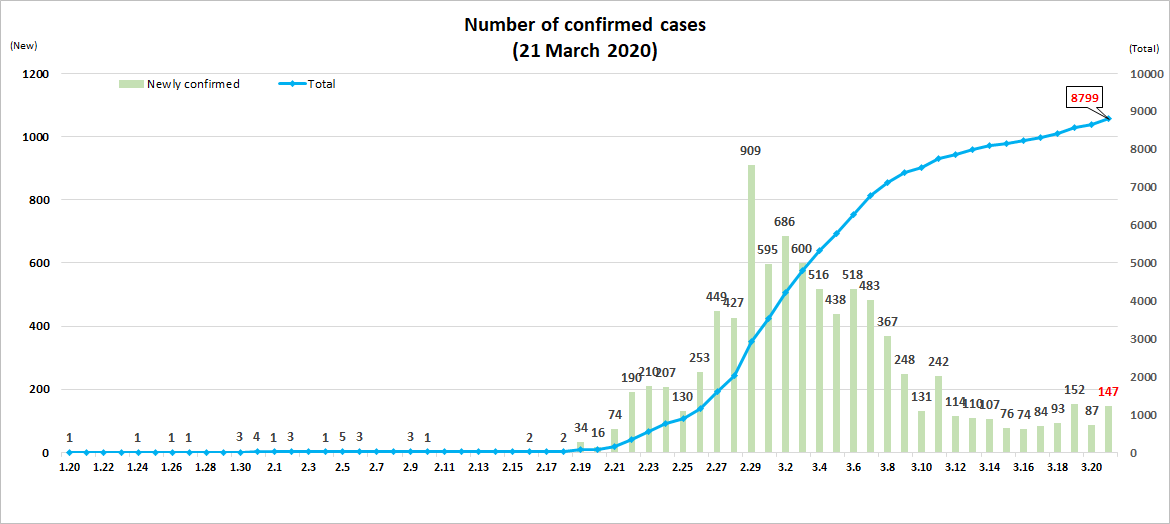
South Korea saw another spike in confirmed COVID-19 cases on Friday, with new clusters of infection detected at nursing homes in Daegu, the epicentre of the Korean outbreak. Increasing cases from overseas were also confirmed, officials said Saturday [Source: The Korea Herald] .147 new cases were reported, bringing the nation’s total confirmed infections to 8,799, according to the Korea Centers for Disease Control and Prevention. Another 379 people were newly declared virus-free, bringing the total number of recoveries to 2,612.
Of the 147 new cases, 69 are in Daegu and 40 in neighbouring North Gyeongsang Province, the two hardest-hit regions, accounting for 72 percent and 14 percent of total infections, respectively, The Korea Herald reported.
Like their Chinese and other Asia counterparts, Seoul authorities are increasingly concerned about how to contain COVID-19 cases arriving from overseas. Six more imported virus cases were reported yesterday, bringing the total to 23.
From tomorrow (Sunday), South Korea will make it mandatory for all arrivals from Europe – Koreans and foreign nationals – to get tested for COVID-19 and self-isolate for two weeks, even if they test negative. The government has created a temporary shelter that can house up to 1,000 travellers from Europe while they await results.
UAE
“Our only traffic through Dubai Airport right now is transit traffic. Today we are closing our arrivals stores.” Those were the sobering words of Dubai Duty Free Executive Vice Chairman & CEO Colm McLoughlin yesterday in an interview for The Moodie Davitt Report’s new podcast series ‘In Crisis – Travel Retail Voices’.
The series speaks to members of the travel retail community all around the world to examine how they, their businesses and even their families are coping with the COVID-19 crisis. For the full story click here and for the podcast click on the icon below.
20 March
International
The United Nations World Tourism Organization (UNWTO) has set up a Global Tourism Crisis Committee to mitigate the impact of COVID-19 on the tourism sector and to accelerate recovery. A high-level virtual meeting was held yesterday, and a set of recommendations will be released in the coming days.
Click here for the full story.

International
[Click on the YouTube icon above to watch The Moodie Davitt Report’s video snapshot of this week’s major developments from the COVID-19 coronavirus crisis]
UK
Manchester Airport will be going down to one terminal from 25 March. All flights had been due to depart from Terminal 2 or 3 will instead depart from Terminal 1.
A spokesperson for the airport said: “Like all airports across the world, Manchester Airport has experienced a significant fall in passenger volumes as a result of the Covid-19 pandemic. Given this reduction in departing and arriving flights, and the likelihood traffic will decline further, we have taken the decision to work towards operating from a single terminal.”
US
The Mayor of Atlanta, Keisha Lance Bottoms, has announced the suspension of the Minimum Annual Guarantee (MAG) payment obligation for concessionaires at Hartsfield–Jackson Atlanta International Airport until 30 June.
South Africa
South African Airways (SAA) will immediately suspend all international operations until 31 May, the airline said today. The move is a response to a government travel ban aimed at stopping the transmission of the coronavirus. Regional and domestic flights will continue for now from Johannesburg and Cape Town airports.
South Africa has declared a State of Disaster after the outbreak of COVID-19. The airline noted that it operates in three markets that are listed as high-risk: the USA (Washington DC and New York JFK), the UK (London Heathrow) and Germany (Frankfurt and Munich). It also operates flights to Australia (Perth) and Brazil (São Paulo), which have been cancelled.
“In support of efforts by government to deal with this pandemic, and in the best interests of our crew, passengers and the public, we have decided to suspend all international flights until 31 May 2020. It is all our responsibility, not just government, to curb further transmission of the virus. In addition, the increasing risks to our crew of contracting the virus including the possibility of being trapped in foreign destinations as a consequence of increasing travel bans cannot be ignored,” said SAA Acting CEO Zuks Ramasia.
UK
Europe’s busiest airport, Heathrow, has pledged to remain open throughout the coronavirus crisis.
Heathrow said its financial operation would be “significantly impacted by this unprecedented situation”. As a result, the airport is immediately reducing operating costs, cancelling executive pay, freezing recruitment and reviewing all capital projects. The management team are also reviewing further actions.
In a statement, Heathrow added: “Prudent management over the past decade means that our business is well funded and in a robust financial position, with cash and committed facilities available of £3.3 billion designed to maintain at least a 12-month liquidity horizon.”
Saudi Arabia
The General Authority of Civil Aviation has said that all domestic flights within Saudi Arabia will be suspended effective from Saturday 21 March. It comes amid a crackdown on all domestic travel, including buses, trains and taxis, amid the COVID-19 crisis. On 15 March, Saudi Arabia suspended international flights for two weeks.
International

China
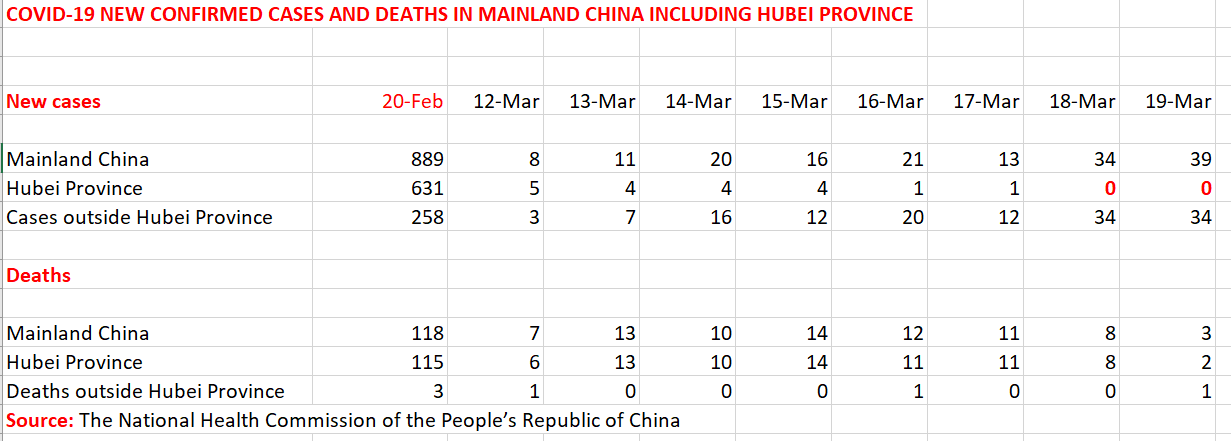
All 39 new confirmed cases in Mainland China yesterday were imported from overseas, according to the National Health Commission of the People’s Republic of China. For the second straight day, no new cases were reported in Wuhan, original epicentre of the outbreak, or in the wider Hubei province.
The pattern and timeline of the illness in China is of critical importance to those countries where COVID-19 is on the rise. The disease began to soar in Wuhan from early January (even as of 14 January, just 41 cases had been confirmed). By 16 February, Hubei province had recorded 1,933 new cases in a single day. Remarkable progress in confining and treating the disease has been made since. Encouragingly 730 patients were released from hospital nationwide yesterday (624 in Wuhan) after being cured. 1,197 people who had had close contact with infected patients were also freed from medical observation. Serious cases decreased by 178.
As of 24:00 on 19 March, 80,967 reports of confirmed cases and 3,248 deaths in 31 provincial-level regions on the Chinese mainland and the Xinjiang Production and Construction Corps has been reported. A total of 71,150 patients have been cured and discharged from hospital.
As reported yesterday, the people of Wuhan have been through almost unspeakable hardship over recent weeks. The frontline medical team who have led the human war against this disease have shown extraordinary courage and commitment. Many have contracted the illness. Some have died.
The video above, courtesy of Chinese state-controlled media Global Times, shows the thunderous welcome that many of those medics received when they left the city, with the outbreak increasingly under control. It offers an enduring testament to the power of the human spirit and the courage of the medical community on whom our lives depend all around the world.
South Korea
Daily counts matter and there is better news to report from South Korea, home to the world’s biggest duty free market. After a spike the previous day which ended a strong run of daily counts under 100 new cases, just 87 new cases were reported by the Korea Centers for Disease Control.
Selective intra-Asian travel is the likeliest first focus of any tourism and travel retail recovery. The COVID-19 numbers in China and South Korea take on particular importance in relation to the daigou business – travel retail’s regional locomotive over the past three years, particularly for beauty products. While limited travel is still taking place between the two countries, retailers and brands hope that confirmation, when it comes, of the disease being under control could spark an early resurgence of the reseller business.
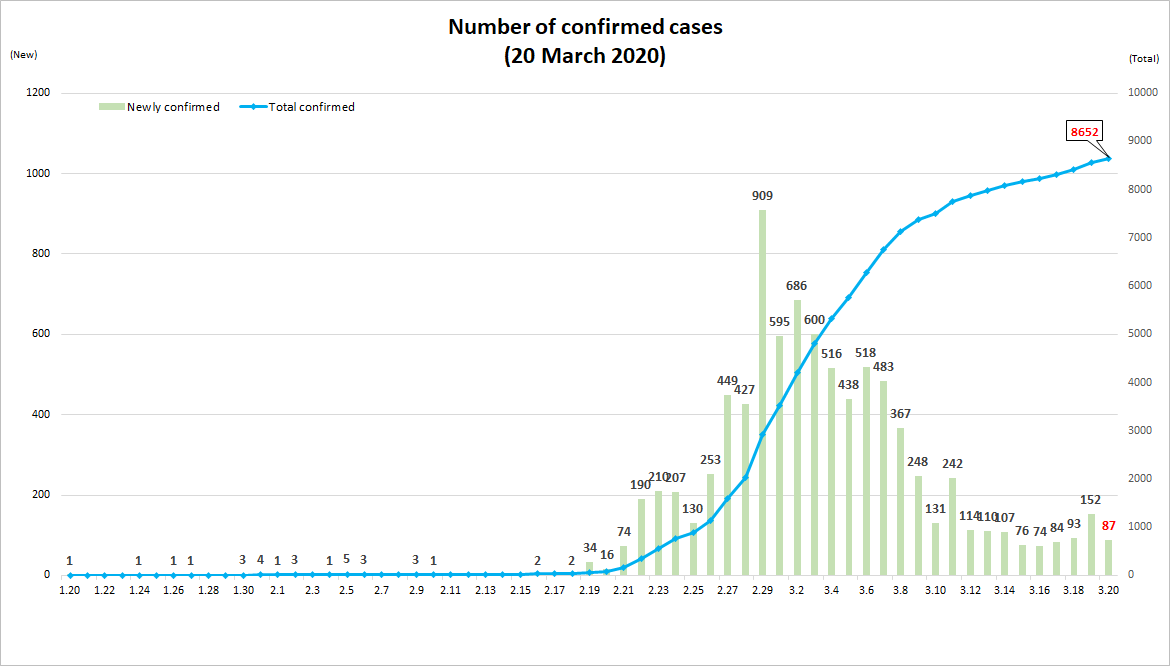
Australia/New Zealand
Four people onboard cruise ship Ruby Princess which berthed in Australia and had also visited New Zealand have tested positive for COVID-19. Other passengers who may have been exposed have disembarked.
New South Wales Health Minister Brad Hazzard has urged all 2,700 passengers and 1,100 crew members who were onboard to self-isolate immediately. It is possible that other passengers who disembarked in Sydney unknowingly contracted COVID-19, Hazzard said. [Source: Stuff.co.nz]
19 March
US
The International Association of Airport Duty Free Stores (IAADFS) has joined other industry associations around the world in calling on airports for support through payment relief. The association has requested that airport partners suspend minimum guarantee payments from 1 March until the end of the COVID-19 crisis.
In a letter to airport partners on 19 March, IAADFS President and CEO Michael Payne said: “We are all facing extremely difficult challenges in view of the COVID-19 pandemic confronting our world and every sector of the national economy. Few businesses are more affected than airports and their partner organisations.”
UK
Edinburgh Airport has revealed a consolidation plan to ensure the airport remains operational in what it is expecting to be a period of zero or close-to-zero passenger demand.
The plan includes a number of retailers and food & beverage operators suspending operations. There will also be terminal consolidation, with certain areas closed, deferred expenditure on some capital projects, and the powering down of high-energy items.
Edinburgh Airport Chief Executive Gordon Dewar said: “Our plan is based on keeping the airport open throughout and being there for those people who are still travelling and those staff members who are making that travel possible.”
Europe
“We are looking at a totemic moment in the reduction of air travel and connectivity between different regions of the world.”
That is ForwardKeys VP Insights Olivier Ponti’s response to the decision to close European Union borders for 30 days to all but essential travel into the bloc. Up to 48,200 flights and 10.2 million seats are in jeopardy, according to the travel analyst.
Click here for the full story.

China
If you watch just one video this week, don’t make it from Netflix, choose this one. As we reported earlier, Hubei Province, whose capital Wuhan was the original epicentre of the outbreak, reported zero new cases yesterday and zero suspected cases. By any yardstick, that represents a breakthrough for a city, a province and a country.
The people of Wuhan have been through almost unspeakable hardship over recent weeks. The frontline medical team who have led the human war against this disease have shown extraordinary courage and commitment. Many have contracted the illness. Some have died. This video, courtesy of Chinese state-controlled media Global Times, shows the thunderous welcome that many of those medics received when they left the city, with the outbreak increasingly under control. It offers an enduring testament to the power of the human spirit and the courage of the medical community on whom our lives depend all around the world.
International
The International Air Transport Association (IATA) and the Association of Asia Pacific Airlines (AAPA) have become the latest organisations to urge government intervention to guarantee the survival of the aviation sector in the wake of the COVID-19 outbreak.
IATA has launched a global campaign but is particularly calling for action in Africa and the Middle East, and suggests direct financial support, loans and tax rebates.
“The scale of the current industry crisis is much worse and far more widespread than 9/11, SARS or the 2008 global financial crisis,” said IATA Director General and CEO Alexandre de Juniac. “Airlines are fighting for survival.” Read more here.
AAPAs estimates that Asian airlines face revenue shortfalls of upwards of US$60 billion this year, and has also proposed a string of emergency relief measures, which you can read about in more detail here.
UAE
The UAE has introduced a blanket ban for passengers of all nationalities from entering the UAE as of noon local time today until further notice. The ban includes the entry of UAE residence visa holders, visa/tourist visa holders and all nationalities for visa on arrival.
UAE nationals, GCC nationals (except Qataris) and diplomatic passport holders are exempted from the new measures, as are passengers transiting through UAE airports.
Dominican Republic
The Dominican Republic has today closed its land, sea and air borders for 15 days, the country’s President Danilo Medina announced.
The only exception to the sweeping measure will be for the departure of foreign citizens returning to their own countries, and the arrival of planes, cargo ships and fuel ships to “guarantee supplies to the population,” Medina said.
South Korea
The country saw a spike in cases over the past 24 hours, dampening confidence after a strong run of daily counts of under 100 new confirmations. 152 new cases were reported by the Korea Centers for Disease Control and Prevention.
As with several other Asian countries, authorities are growing increasingly concerned about the importation of new cases by passengers arriving at the nation’s airports. The Korea Herald reported today that of 4,497 arrivals at Incheon and Gimhae (Busan) airports in the past week, 17 has tested positive for the virus.

Australia
Australian carrier Qantas today announced the suspension of all international flights from the end of March until at least the end of May. The company is also to cut 60% of its domestic flights. The move comes as the Federal Government recommends against all overseas travel from Australia.
Subsidiary Jetstar is also affected. Jetstar Asia (Singapore) will suspend all flights from 23 March to at least 15 April; Jetstar Japan has suspended international flights and cut domestic travel, while Jetstar Pacific (Vietnam) has suspended international flights and will sharply cut back domestic flights.
Qantas and Jetstar will stand down two-thirds of their 30,000 employees until at least the end of May, which the group said would help preserve jobs in the long term.
China
![]() In landmark news, Hubei Province, whose capital city Wuhan was the epicentre of the original outbreak, reported no new cases of confirmed infections yesterday and no new cases of suspected infections. 795 patients were released from hospital after being cured, including 733 in Wuhan, according to the National Health Commission of the People’s Republic of China. The province reported eight deaths, six of them in Wuhan.
In landmark news, Hubei Province, whose capital city Wuhan was the epicentre of the original outbreak, reported no new cases of confirmed infections yesterday and no new cases of suspected infections. 795 patients were released from hospital after being cured, including 733 in Wuhan, according to the National Health Commission of the People’s Republic of China. The province reported eight deaths, six of them in Wuhan.

To put this momentous news in context, as of 24:00 on 18 March Hubei had reported 67,800 cases of confirmed infections (including 50,005 in Wuhan) since the outbreak began and 3,130 deaths (2,496 in the capital). In all, 57,678 patients have been cured and discharged from hospital, including 40,765 in Wuhan.
The battle in Hubei province is not over – there are 6,992 patients still with the disease (including 6,744 in Wuhan) and 2,274 in serious condition (including 2,222 in Wuhan). But by any yardstick, today’s figures represent a breakthrough for a city, a province and a country. The psychological impact alone of the zero count in Hubei province is important, the medical achievement profound.

Across Mainland China 34 new confirmed cases and 23 suspected cases were reported. All 34 cases were imported from overseas, underlining the need for sustained strict monitoring at the country’s airports.
Importantly, 819 patients were released from hospital after being cured. 1,032 people who had had close contact with infected patients were freed from medical observation. Serious cases decreased by 308.
18 March
International
Airports Council International (ACI) World has called for a global policy response to the COVID-19 crisis, noting that the impact on the aviation ecosystem should be “borne equitably”. All solutions must be “fair and reasonable so as to give the industry the greatest chance to recover quickly”, Director General Angela Gittens said.
The organisation has also proposed a series of relief measures, including protection of airport revenues, concession fee payments to governments, tax relief and government assistance where appropriate.
Click here for the full story.

Taiwan
In a mirroring of the pattern in Mainland China (see our story below), a similar concern over COVID-19 cases being imported from Europe has emerged. An Ever Rich Duty Free spokesperson told The Moodie Davitt Report: “Recently Taiwan has confirmed 27 new cases in three days. The tension is building again.
“The Taiwan government has just rolled out a strict entry restriction for non-citizens and it takes effect on March 19, Taiwan time.”
As reported this morning latest statistics from the National Health Commission of the People’s Republic of China, though offering much encouragement in terms of overall new case numbers, also reveal a worrying trend.
For the fifth consecutive day, there were more cases outside Hubei province (the epicentre of China’s outbreak) than within in (highlighted in bold purple in the table below). But also mirroring the pattern of recent days, all 12 recorded yesterday were imported from overseas (5 in Guangdong province, 3 in Beijing municipality, 3 in Shanghai municipality, and 1 in Sichuan province). Stopping a ‘second wave’ is now a critical priority for the PRC government and its counterparts in other Asian zones.
UAE
UAE Attorney General Hamad Al Shamsi has said every person coming to the UAE must self-quarantine for 14 days, Gulf News has reported.
Click here for the latest global travel restrictions
Japan
NAA Retailing has temporarily closed some of its FaSoLa Duty Free core category and destination merchandise stores airside at Narita International Airport terminals 1, 2 and 3. Many other shops and restaurants have adjusted their opening hours. The closures and changes to operating hours run to 31 March initially in most cases.
Airport company NAA said: “Due to the increasing number of coronavirus infections, some shops will close temporarily or change their operating hours.”
Landside shops and restaurants remain open (including those run by NAA Retailing). So too do airside duty free shops managed by ANA Duty Free, JAL-DFS and JATCo, as well as some FaSoLa speciality stores and all luxury boutiques.
At Tokyo Haneda Airport, shops and restaurants remain open but with adjusted opening hours. The TIAT Duty Free airside shops (previously open 24 hours) and most boutiques now open from 7am and close at 10pm, with some open through to midnight daily. The exception is the central zone TIAT Duty Free Shop, which remains open 24 hours, TIAT confirmed to The Moodie Davitt Report.
USA
The Airport Restaurant & Retail Association (ARRA) and Airport Minority Advisory Council (AMAC) have jointly urged US airports and Congress to ensure financial relief measures for their members, airport restaurateurs and retailers. Otherwise, they warned, many will be forced out of business. The call for assistance comes amid the deep and unprecedented business impact caused by the spread of COVID-19.
AMAC Chair John Clark said: “Our members are suffering tremendous sales losses exceeding 50% and in some cases as high as 90%. The industry is facing a major financial crisis. Many businesses, including those classified as small and/or disadvantaged, may not be able to continue operations.”
ARRA Chair Pat Murray added: “Our members’ ability to retain and pay employees, as well as pay rents to airports, has been seriously jeopardised. Some of us will likely be unable to meet our debt obligations and will be forced out of business if quick action is not taken to provide relief.”
For the full story, click here.
International

South Korea
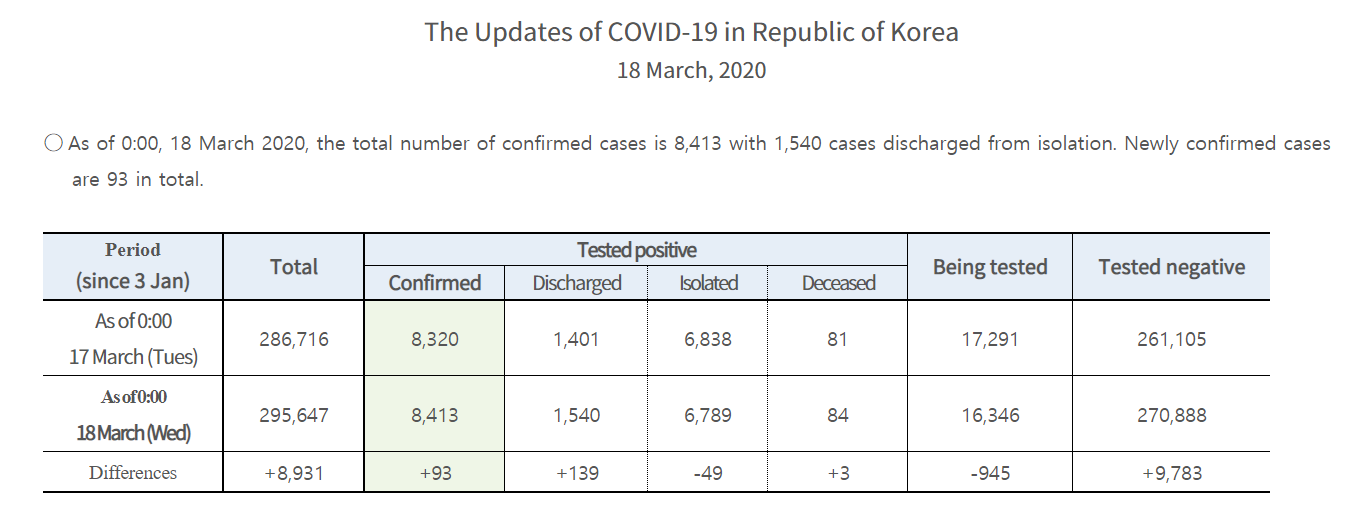
China
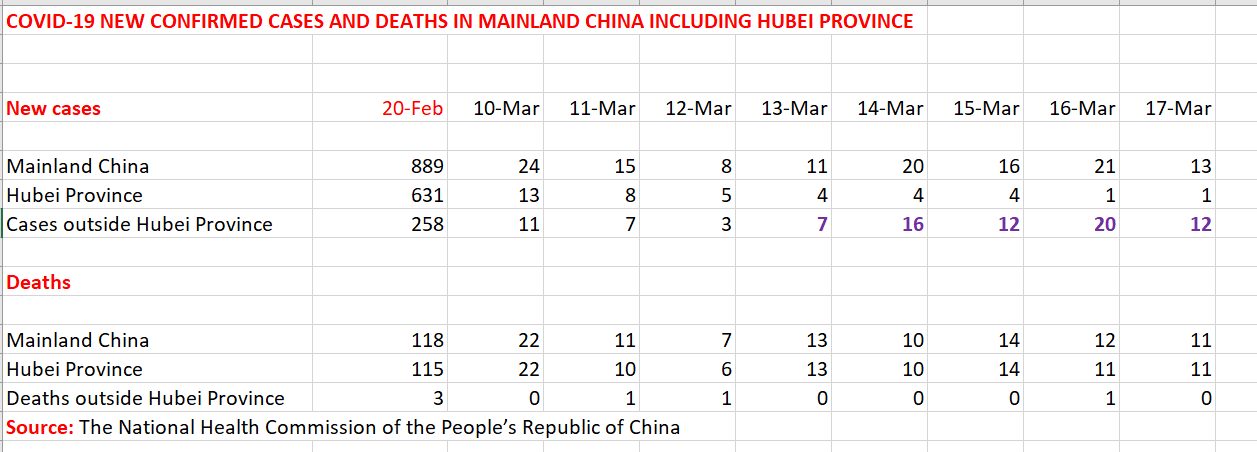
Latest statistics from the National Health Commission of the People’s Republic of China, though offering much encouragement in terms of overall new case numbers, also reveal a worrying trend. For the fifth consecutive day, there have been more cases outside Hubei province (the epicentre of China’s outbreak) than within it (denoted in bold purple above).
Mirroring the pattern of recent days, all 12 new cases recorded yesterday outside Hubei province were imported from overseas (5 in Guangdong province, 3 in Beijing municipality, 3 in Shanghai municipality, and 1 in Sichuan province). Stopping a ‘second wave’ is now a critical priority for the PRC government and its counterparts in other Asian zones (more to follow in a stand-alone story).
Mainland China (including the Xinjiang Production and Construction Corps) reported 13 new cases yesterday and 21 new cases of suspected infections. Encouragingly, 922 patients were released from hospital after being cured and 1,014 people who had had close contact with infected patients were freed from medical observation.
As of 24:00 on 17 March, the National Health Commission had received 80,894 reports of confirmed cases and 3,237 deaths in 31 provincial-level regions in Mainland China while 69,601 patients had been cured and discharged from hospital.
17 March
Estonia/Finland
Tallink Grupp will temporarily suspend the operation of its vessels Silja Serenade and Silja Symphony on the Helsinki-Stockholm route from 19 March. On that day, Finland plans to close its borders to all traffic. The Helsinki-Stockholm route is the largest one for travel retail sales within the Tallink Grupp network.
| At a glance: Today’s major developments – Only 21 new cases were announced in Mainland China, while South Korea had less than 100 new cases for the third consecutive day |
UK
London Gatwick Airport has introduced a raft of cost-saving measures in light of the “unprecedented impact” of the COVID-19 outbreak.
Two of the airport’s six piers will shut, while the airport will also close to flights between midnight and 05.30 from today, except for emergency landings. Gatwick said further operational action was likely to be announced in coming days.
The airport is also deferring spending on its investment programme for the foreseeable future, while the airport’s executive team will take a -20% salary cut and waive any bonus for the current financial year.
Some 200 staff on temporary fixed-term contracts and contractors will also have their employment terminated “in order to protect the business”.
Austria
Vienna Airport is closing most shops and restaurants landside and airside today in response to the COVID-19 outbreak. A limited service will be maintained that includes grocery stores and the pharmacy in Terminal 1.
Airport operations are already limited by travel restrictions, with a full suspension of travel from China, South Korea, Italy and Iran. In addition, flights from Spain, Switzerland, France, UK, Ukraine, Russia and the Netherlands will be discontinued in the near future by order of the Austrian federal government.
Austrian Airlines will cease flight operations by 28 March and Laudamotion by 8 April while other airlines are now winding down their flight schedules.
US
The Global Department Store Summit, due to be held in Seattle 28-29 May, has been postponed to the week of 7-11 June 2021.
Executive Director of the organiser, the Intercontinental Group of Department Stores, Werner Studer said: “We have been constantly monitoring the situation and hoped for the best. It is unfortunate that we have to postpone the event as we have managed to put together a powerful agenda with a great list of top speakers. However, the recent developments of the virus outbreak and its implication on people’s potential health and security exposures have forced us to reset the entire event to next year.”
Further information on 2021’s event will be revealed in autumn of this year.
US/Europe
Some 3.3 million airline seats are at risk of elimination from the market as a result of the US’ transatlantic travel ban on most non-US residents entering the country from much of Europe.
Travel analyst ForwardKeys has revealed the extent of the impact of the ban on airlines and countries in a new report – with the world’s busiest and most profitable segment of the aviation industry “decimated.”
Click here for the full story.

Switzerland
Zürich Airport has closed most shops and restaurants until at least 19 April. Some outlets will remain open, among them pharmacies, grocery stores, kiosks and takeaway food services, said the airport company today. Lounges are also closed, as is the visitor terrace at the airport.
New travel restrictions mean that all visitors from Germany, Italy, Austria and France will undergo checks upon entering the country.
UK
The UK Travel Retail Forum (UKTRF) today called on the UK government to urgently step in to support the aviation and travel retail sector as the impact of travel restrictions on the industry deepens.
The organisation said that traffic had fallen by over -70% in recent days as a result of measures introduced to limit the spread of COVID-19. Those “worst affected are airport operators, travel retail operators, and landside, airside and maritime concessionaires,” said UKTRF.
UK Travel Retail Forum Chair Francois Bourienne said: “COVID-19 poses a clear threat to the UK and international travel system. The government has previously indicated it would take action to minimise the economic damage caused by this pandemic. We know that this crisis is likely to get worse before it gets better, and the need for urgent government support measure is clear.”
For the full story, click here.
Lebanon
Beirut Rafic Hariri International Airport is to cease all commercial flights from Wednesday 18 March until 29 March, by order of the Council of Ministers in Lebanon. Exceptions include flights for military, diplomatic and international agency workers.
Europe
Airports Council International (ACI) Europe President Jost Lammers has written to EU transport ministers ahead of their extraordinary meeting tomorrow (18 March) calling for urgent support measures for the continent’s airports.
“Extraordinary and urgent funding” is needed, he says, with an expected €2 billion revenue loss in the first quarter set to deepen in coming months.
“The unprecedented shock to their traffic and revenues means that several airports are facing cash flow issues – and that an increasing number of them will face such issues in the coming weeks if the situation continues,” Lammers wrote. “These cash flow problems risk becoming systemic for Europe’s airports and raise issues of business continuity, which must be addressed by the EU.”
Click here for the full story.
UK
Manchester Airports Group, the operator of Manchester, London Stansted and East Midlands airports, has announced a number of cost-saving measures to deal with what it calls “a rapid and unprecedented reduction in demand for air travel in and out of the UK”.
The airport operator will over the coming days consult with colleagues and unions ahead of introducing enforced annual leave, reduced working hours, temporary pay cuts and temporary lay-offs. With immediate effect, the executive team has taken a pay cut, recruitment has been frozen and capital expenditure paused.
Manchester Airports Group CEO Charlie Cornish said: “These are difficult decisions and they have not been taken lightly. We recognise the impact they will have on our people and we will be consulting with our colleagues. Our aim will always be to protect jobs wherever possible, and we need to take these steps now to ensure the company’s future.
“It is too early to predict with any accuracy the long-term effects of this crisis. We are seeing many of our airlines and supply chain partners make similar announcements and we are doing what we need to do in the face of an unpredictable and fast-moving situation.”
Billing the COVID-19 outbreak as “the greatest threat the UK’s travel sector has ever faced”, Cornish added: “The UK depends on air travel to supports its economy. The government must stand behind the aviation industry to make sure it is still there and ready to help the economy recover once this is all over.”
Europe
The European Tourism Manifesto alliance has called on the European Commission and national governments to implement several measures to help the travel and tourism sector deal with the COVID-19 pandemic. These are:
- Temporary state aid for the sector
- Fast and easy access to short- and medium-term loans to overcome liquidity shortages
- Fiscal relief starting with small and medium enterprises (SMEs) and extending to economic operators of all sizes
- Protection of workers from unemployment and loss of income through short-time work schemes or upskilling/reskilling programmes and support for self-employed tourism stakeholders
- Fast launch of the European Unemployment Reinsurance Scheme
- Deferment of fiscal and social contributions
- Immediate passing of temporary airport slots waiver
- Support action for the wider field of culture
- Better coordination between national authorities in terms of alignment of travel advice to affected regions
The alliance added: “Action is required now to strengthen the resilience of the sector in the long run and prepare the ground for a swift recovery from this unprecedented crisis.”
China
More good news out of China. Yesterday 930 patients were released from hospital after being cured from COVID-19. A further 1,105 people who had had close contact with infected patients were freed from medical observation. Serious cases decreased by 202.
Only 21 new confirmed cases were reported in Mainland China and only one in Hubei Province, home to the outbreak’s original epicentre of Wuhan. 13 deaths were reported nationwide.
The National Health Commission of the People’s Republic of China reports similarly encouraging news from Hong Kong, Macau and Taiwan, where in each case local government and medical authorities have achieved remarkable control of initially serious outbreaks. As of 24:00 on 16 March, 235 confirmed infections had been reported across the three areas: 157 in Hong Kong (4 deaths and 88 cured and discharged from hospital); 11 in Macao (ten cured and discharged;) and 67 in Taiwan (1 death and 22 cured and discharged).
These are important statistics in analysing the situation that lies ahead in countries where the outbreak is accelerating.

South Korea
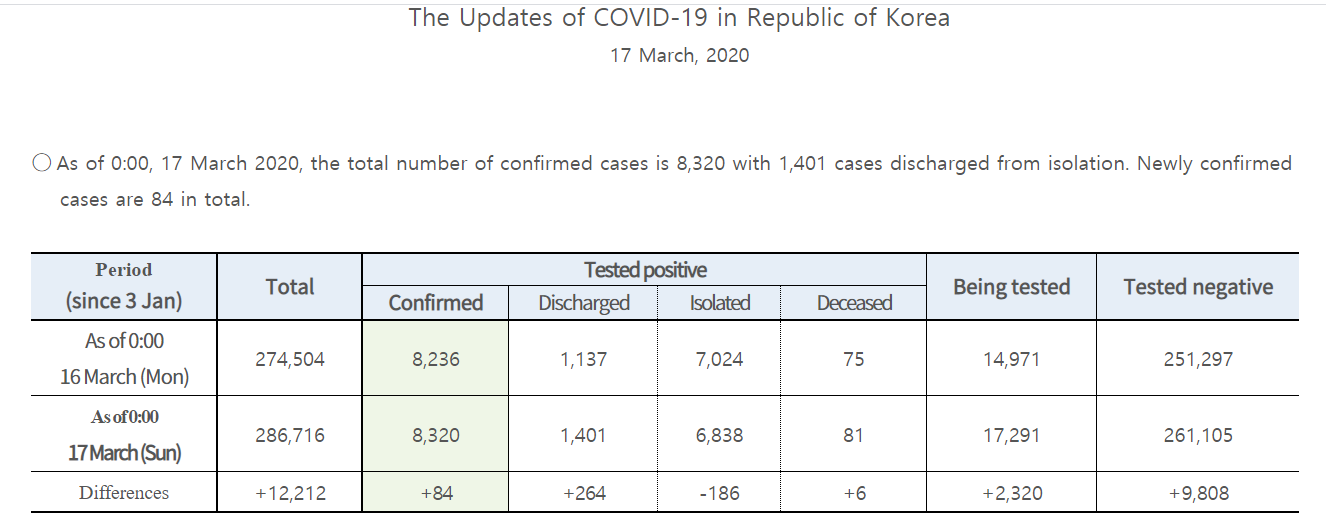
International

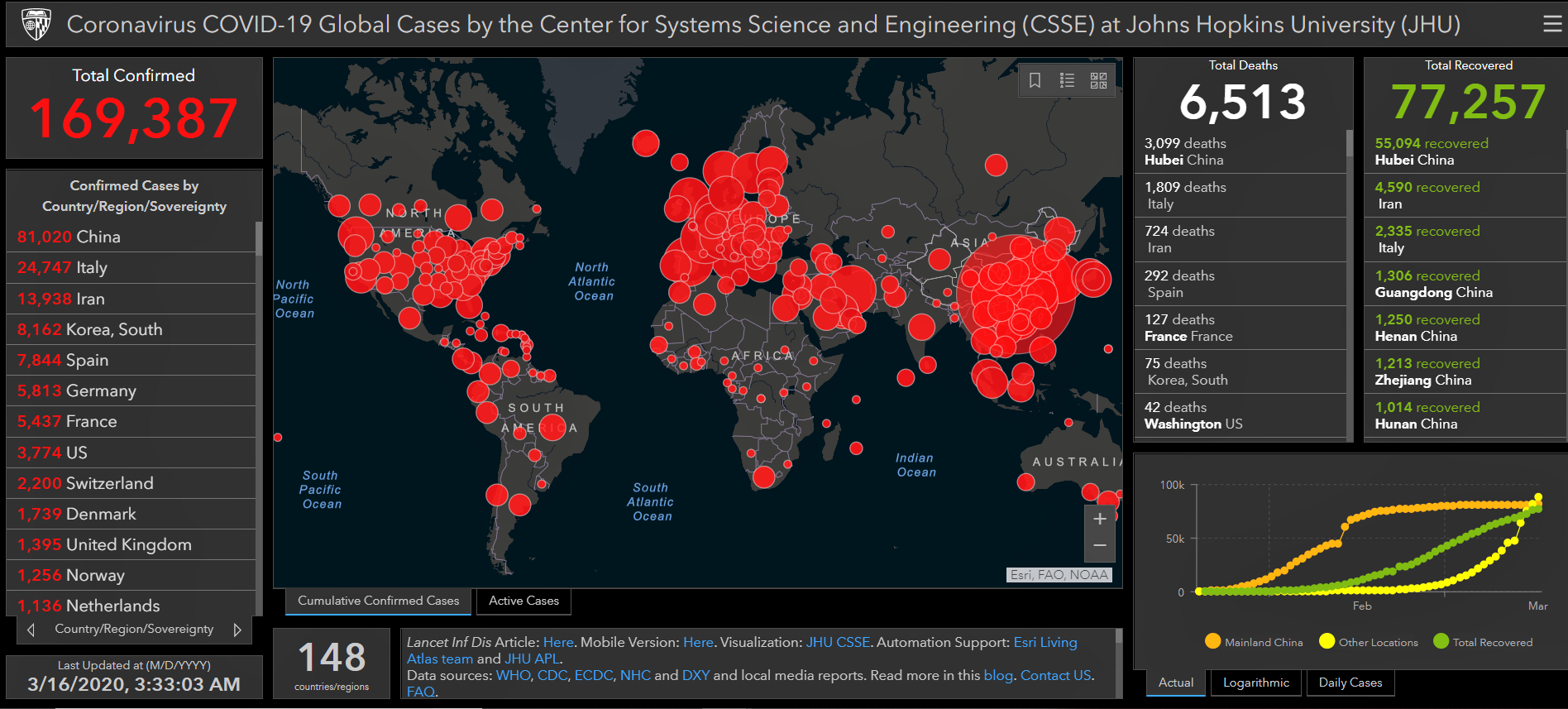
16 March
EU
The EU Commission has proposed that members states adopt a 30-day suspension on non-essential travel into the region. Commission President Ursula von der Leyen suggested the move in a call with G7 leaders today. The move will essentially shut down long-haul travel to and from the region for the month ahead.
In a video message, she said: “The less travel, the more we can contain the virus. I propose temporary restrictions on non-essential travel to the EU. These should be in place for an initial 30 days, which can be prolonged.”
Importantly, she said later that the ban would exclude UK-EU travel. There are also exemptions for long-term residents, family members of EU nationals, diplomats and medical and care workers.
| At a glance: Today’s major developments – China and South Korea continue to post encouraging numbers for new cases |
India
India will prohibit all travel to the country from European Union and European Free Trade Association member countries as well as Turkey and the UK from midnight on 18 March.
At the same time, compulsory quarantine for a minimum period of 14 days will be introduced for passengers coming from/transiting through the UAE, Qatar, Oman, and Kuwait.
Both measures will be in force until 31 March 2020, when they will be reviewed.
Europe
Ryanair has said it expects to ground most of its fleet in the next seven to ten days and has not ruled out ceasing operations entirely for a period.
The airline said it had seen a substantial decline in bookings over the last two weeks, and expects this to continue for the foreseeable future.
A statement today said: “Over the past seven days, Italy, Malta, Hungary, Czech Republic, Slovakia, Austria, Greece, Morocco, Spain, Portugal, Denmark, Poland, Norway and Cyprus have imposed flight bans of varying degrees, from all flights to/from the country, or banned flights to/from countries with high risk of Covid infection. Over the weekend for example, Poland and Norway have banned international flights, while in other countries (without travel bans) there has been severe reduction of ATC and essential airport services.
“Ryanair expects the result of these restrictions will be the grounding of the majority of its aircraft fleet across Europe over the next seven to ten days. In those countries where the fleet is not grounded, social distancing restrictions may make flying to all intents and purposes, impractical, if not, impossible.
“For April and May, Ryanair now expects to reduce its seat capacity by up to -80%, and a full grounding of the fleet cannot be ruled out. Ryanair is taking immediate action to reduce operating expenses, and improve cash flows. This will involve grounding surplus aircraft, deferring all capex and share buybacks, freezing recruitment and discretionary spending, and implementing a series of voluntary leave options, temporarily suspending employment contracts, and significant reductions to working hours and payments.”
Philippines
Duty Free Philippines yesterday closed its Fiesta Mall and Luxe Duty Free stores in Manila, and will close its Ninoy Aquino International Airport shops in the capital tomorrow as a preventative measure against the spread of COVID-19. Regent Asia duty paid stores are also being closed along with all other stores at the airport.
The Philippines government yesterday imposed strict home quarantine measures and halted work across the main island of Luzon, home to metropolitan Manila, effectively putting half the country’s population on lockdown.
International
Royal Caribbean Cruises has suspended all its sailings until 11 April. In a statement, the cruise line added: “We will conclude all current sailings as scheduled and assist our guests with their safe return home.”
Estonia
Leading maritime travel retailer Tallink Grupp will suspend operations on its Tallinn-Helsinki route from tomorrow, 17 March, with the Silja Europa remaining in Tallinn until further notice. The move follows the suspension of other Tallink routes, including Tallinn-Stockholm, in recent days.
France/International
Groupe ADP and local authorities have announced the suspension of passenger traffic at Amman Queen Alia International (Jordan), Riga (Latvia) and Ohrid (Macedonia) airports under measures to combat the impact of the COVID-19 outbreak.
Amman, the gateway to Jordan, will halt flights from tomorrow until further notice, while Riga, which serves the Latvian capital, will suspend international flights from tomorrow until at least 14 April.
Of the airport closures Groupe ADP said: “For the international platforms of Groupe ADP, [there will be] a complete closure of the airports of Amman in Jordan, Ohrid in Macedonia and Riga in Latvia. Operations with very low traffic are expected for the group’s airports in Tunisia, in Saudi Arabia and in Madagascar. The airports in Turkey and Georgia remain open at this stage even if infrastructure optimisations are considered to accompany the decline in traffic.”
ADP has also assessed the potential impact on EBITDA and revenues, and offered relief for its partners in Paris. For more, click here.
International

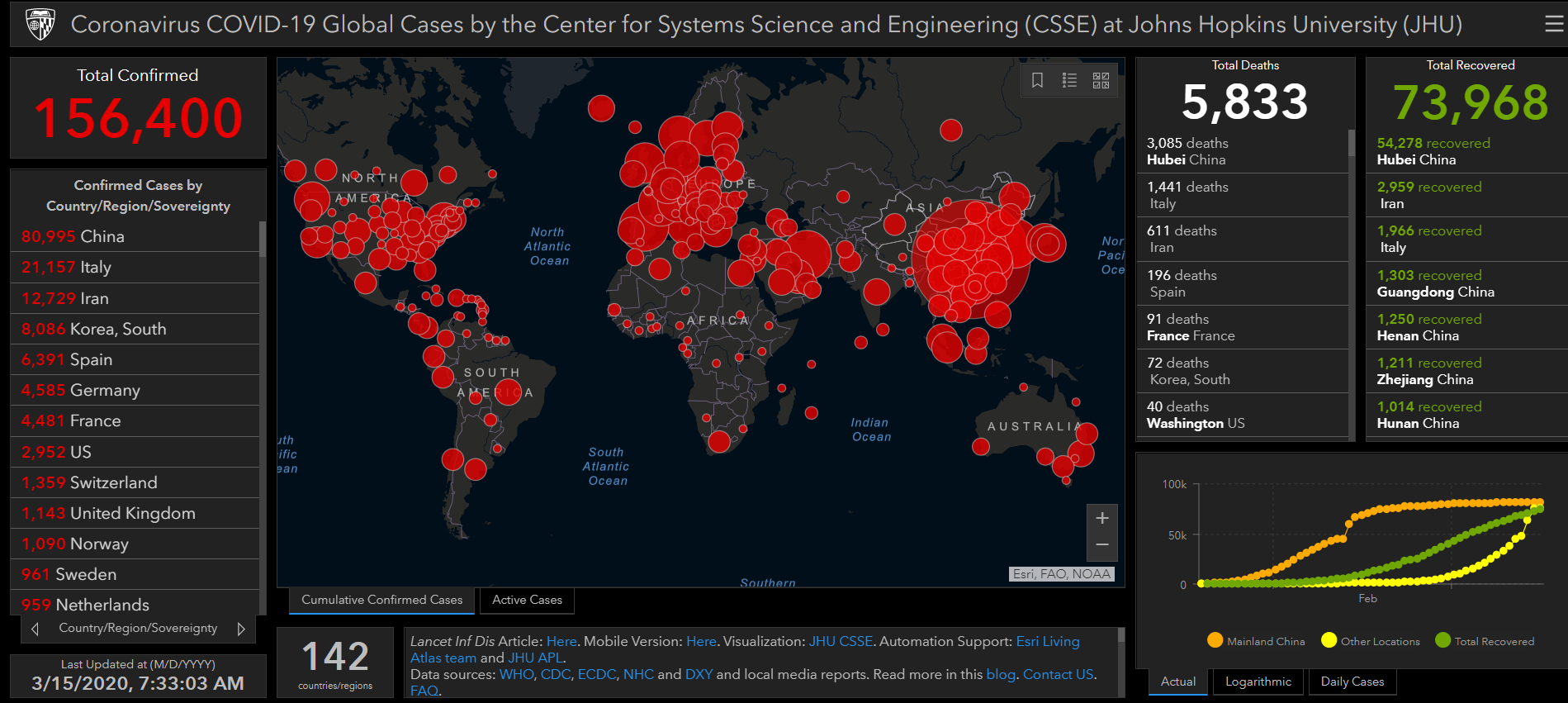 Another day in the COVID-19 crisis. The heat maps and country counts from Johns Hopkins University show the daily change in numbers and spread. Click charts to enlarge and click here for a (safe) link to an individual country tally.
Another day in the COVID-19 crisis. The heat maps and country counts from Johns Hopkins University show the daily change in numbers and spread. Click charts to enlarge and click here for a (safe) link to an individual country tally.South Korea
On top of the encouraging news from China this morning, we bring you heartening information from South Korea where just 74 new cases were reported yesterday by the Korea Centers for Disease Control and Prevention.
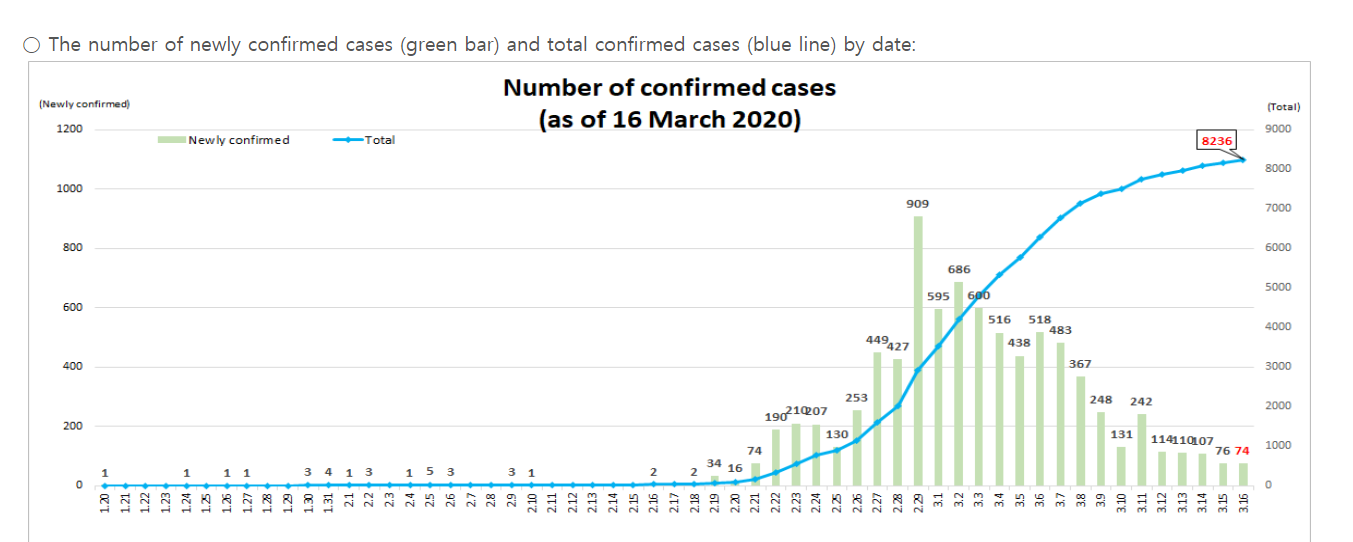
China
Here are the key numbers from China and they are encouraging.
As of 24:00 on 15 March, the National Health Commission of The People’ Republic of China reported just 16 confirmed new cases in Mainland China for the day, four of them in Hubei Province (all in the capital Wuhan) and 12 elsewhere (all imported from overseas). China’s growing challenge now is to stop the disease from being reimported from offshore.

Underlining the vast scale of the challenge fought by the Chinese authorities and people in recent weeks, the National Health Commission revealed that 80,860 confirmed cases and 3,213 deaths have been reported since the outbreak began across 31 provincial-level regions on the Chinese Mainland and the Xinjiang Production and Construction Corps. In all, 67,749 patients have been cured and discharged from hospital. 9,898 confirmed cases remain (including 3,032 in serious condition) and 134 suspected cases.
So far, 680,462 people have been identified as having had close contact with infected patients. 9,582 are now under medical observation.
15 March
From the Publisher
From today, the focus and tone of our coverage of the COVID-19 pandemic, and the crisis that the outbreak has prompted in the aviation, tourism and travel retail sectors, shifts.
The outbreak is simply moving so fast, the crisis deepening so alarmingly, that it is impossible to give adequate space to the key sector and medical developments each day. This crisis is swamping our sector and many of the businesses within it.
Analysis globally suggests that retail, hospitality and travel are the sectors with most businesses at risk of going into liquidation, as consumers choose or are forced to stay away. Our industry combines all those sectors, and both those dynamics, in one.
All companies in our industry, from giant Korean conglomerates to family-run concerns, from airports to retailers to brand houses, face distressing financial and human pressures amid this crisis. I write not just as a commentator; for as a pure play travel retail enterprise we are among those companies.
As revenue dries up with frightening speed, costs need to be slashed to aid, though not guarantee, company survival. Costs often equate to people, and all around the travel retail and aviation community, business leaders are having to make unpalatable employment decisions and managers and staff having no choice but to accept them.
It was as if each of them was simply trying to come to terms with the change to the human condition as much as they were trying to navigate the immediate future of their businesses. |
Cash flow is a dilemma for many. Prudent cost management and cash reserves are keys to weathering the storm – but for how long?
Travel retail has faced many great moments of adversity. We talk often, and rightly, about the sector’s historic resilience to – and ability to bounce back from – crises caused by geo-political events. Due to a combination of COVID-19’s geographic spread, its ferocious advance and its direct sector impact, this pandemic, for so long a China-related crisis and now a global one, is the greatest challenge of all.
From now, then, our coverage becomes less a blow by blow development of how COVID-19 is impacting our sector – there are simply too many blows to keep up – and more a regular analysis of how our world stands. Commentary becomes more important than news: where are the green shoots of recovery? What are the prospects for and likely speed of recovery? The lessons from crisis – and there are many already becoming obvious, none more so than the giant fault line that runs through the airport concession model – can wait. This is now all about making it through the storm.
– Martin Moodie, Founder & Chairman, The Moodie Davitt Report
| At a glance: Today’s major developments – China numbers remain low double digit. |
China (Hong Kong)
Passenger traffic at Hong Kong International Airport (HKIA) fell by -68% year-on-year in February to 1.9 million as a result of the COVID-19 outbreak. For the first two months of this year, HKIA handled 7.6 million passengers, a year-on-year decrease of -38.5%.
The combined decline of passenger volume in January and February was mainly caused by a -63% year-on-year slump in visitor traffic.
Airport Authority Hong Kong said: “Passenger traffic was particularly impacted in February due to weak travelling demand amid the outbreak of COVID-19, in addition to immigration restrictions and quarantine measures implemented by authorities in different countries and regions.
“Traffic to and from Mainland China and Southeast Asia recorded the most significant decreases in the month. It is expected to see continued drop in traffic figures in March as airlines have suspended more flights, and authorities in different markets continue to implement immigration restrictions and quarantine measures.”
Israel
Israel Airports Authority has closed all its shops and most food & beverage outlets at Ben Gurion International Airport, following a government directive yesterday for all such non-essential services to shut nationwide.
Israel Airports Authority Director General – Commerce and Business Development Yoram Shapira confirmed the decision to The Moodie Davitt Report. “We left some F&B sites open but all others (shops and restaurants) are closed after last night’s decision by the government that all shopping malls etc. would be closed until we will pass this virus crisis.
“You can just pick up your takeaway, that’s it. You cannot sit in a restaurant – we are only operating a coffee bar service.”
The main retailer at Ben Gurion is JR/Duty Free, James Richardson – a joint venture between JR and Gebr Heinemann of Germany.
Shapira said that passenger traffic in March had plummeted 75-80% year-on-year. Most of those are Israelis returning home, non-Israeli Jewish visitors entering or non-Israelis leaving.
“Traffic has already dropped dramatically but as it looks right now, it will drop even more dramatically in a week or two,” he said.
Shapira said it was the worst crisis he had seen at the airport in a career at the commercial department dating back to early 1989. That included periods of major conflict with Israel’s neighbours as well as global events.
“I have never been in this situation – never. Most of the time you know what to do and how to handle it. This time no. People are afraid to fly. And when they arrive back they have to stay at home for 14 days, so no-one wants to fly anyway.”
“We are living in unprecedented times,” another Israeli travel retail executive told The Moodie Davitt Report.
France
Group ADP has closed its shops and restaurants at Paris Charles de Gaulle (CDG) and Orly airports because of the COVID-19 crisis in France and beyond.
“All non-essential shops at Paris-CDG and Paris-Orly airports will be closed from midnight on Saturday [15 March] until further notice. Relay shops, mini-markets, pharmacies and takeaway food-only stores will remain open,” Aude Ferrand, Group ADP Retail Director Shops, Food & Beverage, Advertising, Financial services under Terminals, told The Moodie Davitt Report.
Société de Distribution Aéroportuaire, the joint venture between Aéroports de Paris and Lagardère Travel Retail has closed its duty free and most specialist retail stores. Relay and other convenience shops such as M&S Simply Food will stay open as they are being considered ‘Essential Stores for the Continuity of Service’, Lagardère Travel Retail CEO France & Luxembourg Vincent Romet told us.
Some F&B units will remain open in the airside area, including Eric Kayser, Paul Brioche Dorée, and Starbucks but no seating is allowed.
On Saturday evening, French Prime Minister Edouard Philippe announced the closure of all places “non-essential” to public life, including restaurants, cafes, cinemas and discos, effective midnight. “We must absolutely limit movement, meetings and contacts,” he said on Saturday evening. Food shops, tobacconists, banks and public transport will remain open.
SDA said in an email: “Following our Prime Minister’s announcement this evening, and after consultation with [Group] ADP, all sales points will be closed tomorrow morning.” All managers were told to inform staff not to turn up to work.
In related news Paris-Orly Airport 2 will be temporarily closed from 17 March until further notice.
China

South Korea
New confirmed case numbers continue to fall with just 76 new cases reported yesterday, according to the Korea Centers for Disease Control and Prevention. The tally continues an encouraging recent daily trend (see graph below):
13 March: 107
12 March: 110
11 March: 114
10 March: 242 (the only spike of recent days)
9 March: 131
8 March: 248
7 March: 367
6 March: 483
5 March: 518
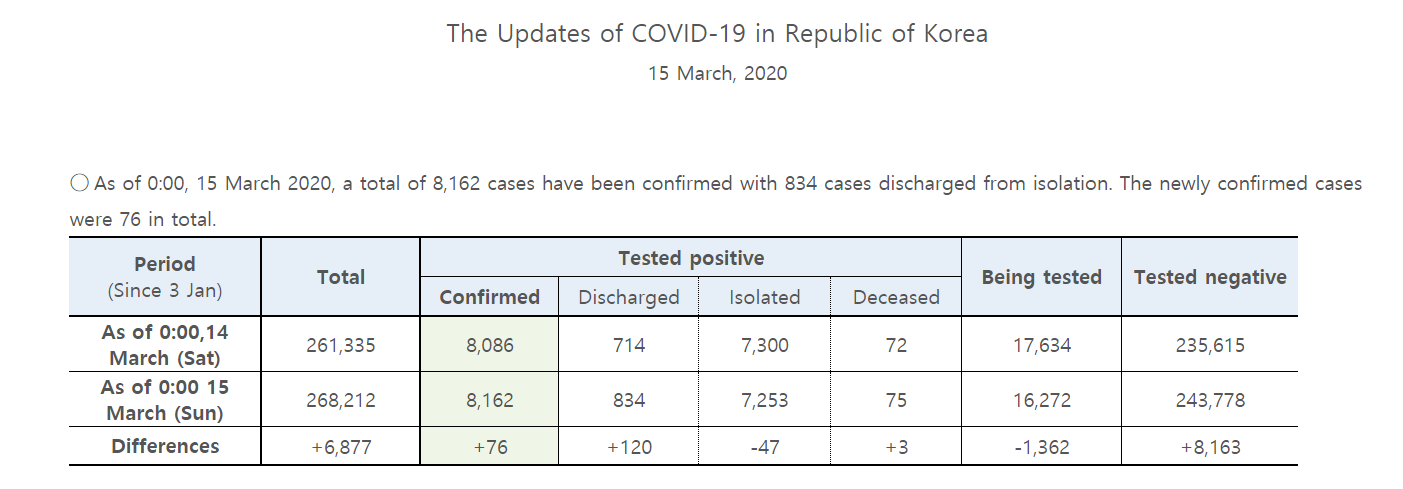
International


14 March
| At a glance: Today’s major developments – Spain is on lockdown. Only supermarkets and pharmacies remain open. From Monday people will not be allowed to leave their homes except for supplies or exceptional reasons. |
New Zealand
Everyone arriving in New Zealand (whether a national or foreigner) from midnight Sunday must isolate themselves for 14 days. As of midnight Saturday, no cruise ships will be able to dock in New Zealand until June 30.
“We must plan and prepare for more cases. We must go hard and we must go early. We must do everything we can to protect the health of New Zealanders,” said Prime Minister Jacinda Ardern at a media conference.
“Alongside Israel and a small number of Pacific islands who have effectively closed their borders, this decision means New Zealand will have the widest ranging and toughest border restrictions of any country in the world.”
She also warned New Zealanders against all non-essential foreign travel. All measures will be reviewed in 16 days time. The news, though generally welcomed by Kiwis, will have a devastating impact on tourism (and travel retail).
Estonia
Tallink Grupp said today that it will suspend sailings on its Tallinn-Stockholm route from 15 March until further notice. It affects the passenger vessels Baltic Queen and Victoria I.
The company said the move was due to the “state of emergency declared in Estonia and to ensure the health and safety of people around the Baltic Sea”. Tallink said yesterday that it would suspend its cruise service on the route and offer only one-way tickets; now it has taken the measure a step further by suspending the route entirely.
In 2018, the Stockholm-Tallinn route handled one 1 million passengers out of 9.75 million in total for the group.
South Korea
New confirmed case numbers continue to fall with just 107 new cases reported yesterday, according to the Korea Centers for Disease Control and Prevention.
The tally continues an encouraging recent daily trend:
12 March: 110
11 March: 114
10 March: 242 (the only spike of recent days)
9 March: 131
8 March: 248
7 March: 367
6 March: 483
5 March: 518

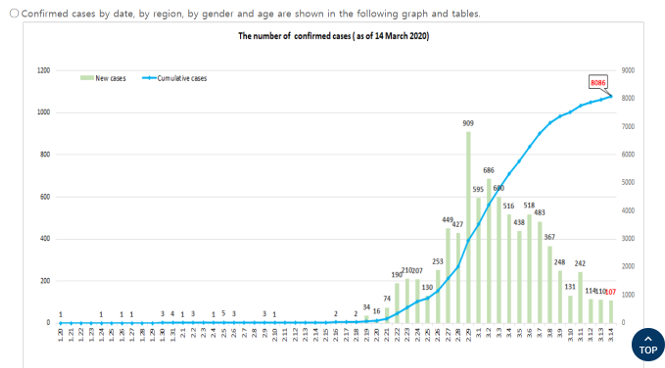 The charts above and below show the improving situation in the Republic of Korea and how it is focused on the city of Daegu. Source: Korea Centers for Disease Control and Prevention; Click to enlarge
The charts above and below show the improving situation in the Republic of Korea and how it is focused on the city of Daegu. Source: Korea Centers for Disease Control and Prevention; Click to enlargeNorway
Norway’s airports company Avinor is to close nine regional airports to commercial traffic from 18 March. It did not say how long the closures would last. The regional airports in question are Vardø, Berlevåg, Sørkjosen, Stokmarknes, Svolvær, Mo i Rana, Mosjøen, Førde and Sandane.
The move, said Avinor, was to “enable displacement of personnel and equipment to other airports.”
Avinor CEO Dag Falk-Petersen said: “With the aim of safeguarding our society, the Norwegian government has implemented the most pervasive measures in peacetime. In this situation, Avinor’s task is to contribute to ensuring that life, health and vital social interests are safeguarded for the entire nation throughout the crisis. The transport sector and Avinor have been defined as central parts of national emergency preparedness. The closing is done to ensure that this preparedness can be maintained over time.
“To ensure that we have an operational network of airports, we are now freeing up resources in order to increase robustness at other airports, and with that, securing our operational capability over time.”
Falk-Petersen said that further action was being considered “including at Oslo Airport”, without specifying what measures would be taken. Airport closures, especially those serving international traffic, would have a sharp impact on travel retail sales, especially in the critical arrivals channel, managed by Gebr Heinemann at the major Norwegian airports.
As the COVID-19 outbreak spreads, the Norwegian Directorate of Health has said that all individuals arriving to Norway from countries outside of the Nordic states will be quarantined (or must return home).
China

For updates pre 14 March click here.




